Grant Goddard's Blog, page 2
June 12, 2025
Diversity within UK radio workforce largely confined to stations targeting minorities : 2010 : BBC Trust
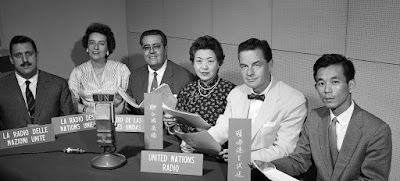
“Leadership of the [UK broadcast] industry appears to remain in the hands of predominantly white, able-bodied men”. Broadcast Training & Skills Regulator, Equal Opportunities Report 2008
In the United States, ‘diversity’ has been described as:
One of the “paramount goals of broadcast regulation in America”; “One of the foundation principles in communications policy”; “A broad principle to which appeal can be made on behalf of both neglected minorities and of consumer choice, or against monopoly and other restrictions”.American Professor Philip Napoli portrayed the objective of ‘diversity’ in US broadcasting policy as a derivative of First Amendment goals to promote informed decision-making, cultural pluralism, citizen welfare and a well-functioning democracy. Napoli described the ‘diversity’ objective in terms of a ‘marketplace of ideas’:
“Thus, the marketplace of ideas has been conceived by the courts, legal scholars, and policymakers as a key dimension of First Amendment freedoms, in which citizens are free to choose from a wide range of ideas (content diversity), delivered from a wide range of sources (source diversity). The citizens then partake of this diversity (exposure diversity) to increase their knowledge, encounter opposing viewpoints, and become well-informed decision-makers who are better capable of fulfilling their democratic responsibilities in a self-governing society”.
Napoli created a flowchart that outlined the primary dimensions of diversity, their component parts and their presumed relationships:
Source Diversity → Content Diversity → Exposure Diversity
1. Ownership 1. Program-Type Format 1. Horizontal
a. Programming 2. Demographic 2. Vertical
b. Outlet 3. Idea/Viewpoint
2. Workforce
In the United States, it was thought that the ultimate public policy goal of ‘exposure diversity’ could be achieved through significant regulatory intervention in the broadcast industry to forcibly create the antecedents ‘source diversity’ and ‘content diversity’. However, the latter interventions have remained mere proxies for the policy goal and, from empirical evidence over several decades of intervention, Napoli concluded that:
“The expectation that increased diversity of sources leads to increased diversity of content is far from a certaintyIt may be that increases in content diversity should be considered essentially meaningless from a policy perspective if the additional content is ignored by the audience”.By contrast, in the United Kingdom, ‘diversity’ has not been a prime policy objective of broadcast regulation. In part, this derives from the historical difference in the development of broadcasting between the two countries. In the United States, broadcasting evolved as a wholly commercial industry, propelled by competing stations serving local markets. In Europe, the model was state-controlled broadcast monopolies serving national audiences, supplemented only relatively recently by commercial competitors. In the US, broadcast evolution has been bottom-up, whilst the European model was entirely top-down.
More recently in Europe, ‘diversity’ has come to be recognised as an important policy issue in media regulation. In 2003, the Council of Europe’s Committee of Ministers described ‘cultural diversity’ as an “essential public interest objective” in its member states’ measures to promote the democratic and social contribution of digital broadcasting.
In the UK, a report commissioned by government agency NESTA in 2001 concluded that:
“Cultural diversity amongst viewers, broadcast employees, producers and broadcast suppliers has noticeably worsened during the last ten yearsOver the last decade, there have been a decline in the numbers of black people employed in influential positions in broadcasting; a decline in the numbers of programmes targeting black viewers and a decline in the numbers of black-owned production companies being commissioned by broadcastersDiversity tools such as ethnic minority supplier targets; contract compliance; ring fenced resources; and publicly available monitoring data, have been recommended by a variety of industry organisations but have not been adopted by many broadcasters”.The ‘diversity’ issue in broadcasting was placed centre stage when (as explained in a BBC presentation):
“In April 2000, a man stood up at the Race In The Media Awards in London and said … ‘The BBC needs to change dramatically if it is to be a serious player in 21st Century Britain.’ His name was Greg Dyke, Director General of the BBC”.
As a result, then BBC director of sport, Peter Salmon, was appointed to champion cultural diversity within the BBC, and he pledged:
“Changing the culture of the BBC has been crucial to ensuring an atmosphere in which diversity can flourish. The ‘One BBC’ initiative, which encourages risk-taking, honest discussions, creativity and dynamism across the whole of the BBC, has been an integral part of supporting our wider aims around diversity – a BBC fit for the 21st Century Britain”.
A decade after Dyke’s statement, it is instructive to document the levels of ‘diversity’ achieved in the UK radio industry as a whole, as well as in BBC radio. This is intended to help benchmark the extent to which independently commissioned radio content satisfies the ‘diversity’ requirement stipulated in the BBC Agreement. Borrowing the framework of Napoli’s flowchart, the issues of ‘source diversity’, ‘content diversity’ and ‘exposure diversity’ are examined in turn.
As a consequence of the Licence Fee system by which public broadcasting is funded, it could be argued that the BBC belongs to all paying households in the United Kingdom. The headline data on the composition of the population demonstrate that:
50.9% of the total UK population are female (31.0 million); 7.9% of the total UK population belong to ethnic minorities (4.6 million); 17.2% of the total UK population are disabled (10.6 million); 16.2% of the total UK population live in Wales, Scotland or Northern Ireland (6.9 million); 5.4% of the total population of Great Britain believe in non-Christian religions (3.1 million).The increasing ‘diversity’ of the UK population in the 21st Century theoretically translates into a more diverse collective ownership of the BBC. Each of us expects something back from BBC radio in the form of content that reflects our particular citizenship, be that our gender, our geographical location, our ethnicity or simply our love of jazz music. This multiplicity of competing demands obviously presents a major challenge for the BBC, much of whose content is broadcast to mass audiences on national Networks.
CHART: Market shares of the commercial radio sector by owner (% share of listening to commercial radio in Q4 2009)
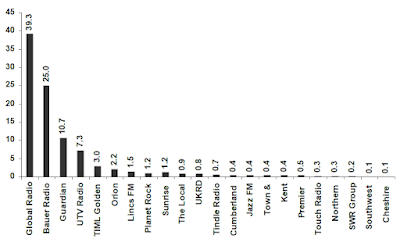
In the commercial radio broadcast sector, consolidation permitted by the Communications Act 2003 has resulted in more concentrated ownership of the UK’s more than 300 commercial stations. Whereas, eight years ago, the three largest station owners accounted for 54% of commercial radio listening, they accounted for 75% in Q4 2009. The largest commercial radio group, Global Radio, was responsible for 39% of commercial radio listening in Q4 2009.
At the same time, the number of commercial radio analogue stations has increased substantially from 106 in 1990 to more than 300 presently and, as a result, a more diverse range of content is now offered to listeners. For example, the first commercial radio station to target an ethnic audience was licensed in 1990, and the first religious station in 1995. The DAB digital radio platform has also carried an increasing number of stations, although the reach of these services has been limited by the slow public take-up of DAB receiver hardware.
Ofcom does not publish data on the diversity of ownership of commercial radio licensees. However, the ownership of commercial radio would appear to have narrowed substantially as a result of consolidation. Although it is clearly not the BBC’s responsibility to balance the impact of less diverse ownership within the commercial radio sector, it nevertheless highlights the imperative for BBC radio to reflect the increasing diversity of the population it serves.
Napoli’s second issue of programming ownership has little relevance for the UK radio market because the overwhelming majority of content broadcast by both BBC and commercial radio is originated by the broadcaster itself, rather than sourced externally. Hence, the diversity of programme ownership is largely a product of the diversity in ownership of the broadcast outlets.
2. WorkforceEmpirical data outlining the diversity of the radio broadcasting workforce derive from three sources: Skillset, the Broadcast Training & Skills Regulator and the BBC.
Skillset, the Sector Skills Council for the creative media industries, conducted an Employment Census in 2009 which estimated that 19,900 persons were employed in the radio broadcasting industry (BBC and commercial). Of the total:
16% were freelance47% were female7.9% were from ethnic minorities2.6% were disabled.These results were extrapolated from only 77 completed questionnaires returned from employers in the broadcast radio sector and from 9 in the community radio sector. This response rate may also explain Skillset’s estimate that, of 400 chief executives employed in radio broadcasting, 100 are freelance, 100 are female, 50 are from ethnic minorities and 50 are disabled.
Within its analysis of employment in the radio sector, Skillset noted that:
Women make up almost half the workforce, a greater proportion than that of the audiovisual industry as a wholeThe radio industry employs a low proportion of ethnic minority staff relative to its locations in London, Northwest and Southeast England, where 60% of the radio workforce is locatedIn London, 11% of the radio workforce is from ethnic minorities, whereas 25% of the capital’s population of working age is from ethnic minoritiesDisabled people comprise a higher proportion of the radio workforce than in the audiovisual industry as a wholeThe age profile of the radio workforce is slightly older than that of the creative media workforce as a whole.Skillset’s ‘Diversity Strategy’ for the media sector stated:
“Diversity, the drive to create a genuinely inclusive culture, is increasingly recognised as a business critical issue. Managing diversity successfully helps business to respond effectively to ever more diverse markets and to achieve new levels of creativity and innovation. … However, one look at the overall demographic profile of the sector’s workforce and it becomes apparent that there is still a long way to go to make it truly inclusive of our society as a whole”.
Skillset estimated that 48% of the total radio industry workforce is employed by the BBC, 43% by commercial radio, and 9% by community radio. Skillset found that the proportion of freelancers in the commercial radio sector was twice the proportion working in BBC radio.
The Broadcast Training & Skills Regulator [BTSR] collects data from broadcasters regarding the promotion of equal opportunities and training, as required by Section 337 of the Communications Act 2003. Broadcasters employing fewer than 21 staff (the majority of local commercial radio stations) are exempt from this requirement to supply data. The latest BTSR report, based on 2008 data, collated returns from 29 companies in radio, and nine companies working in both radio and television. Unfortunately, data from the latter nine bi-media companies (which probably include the BBC, Bauer and UTV) are not separated into ‘radio’ and ‘television’, making it impossible to build up a complete picture of the radio sector.
BTSR data from the returns of 29 radio-only companies found that 7,021 people were employed in radio broadcasting in 2008, of which:
46.1% were female, of which:12.7% at board level were female31.8% in senior management were female64.2% in administrative & support functions were female38.4% on freelance or contract basis were female3.2% were from ethnic minorities, of which:11.4% at board level (9 persons) were from ethnic minorities3.6% in senior management (7 persons) were from ethnic minorities2.5% in administrative & support functions were from ethnic minorities1.4% on freelance or contract basis were from ethnic minorities0.4% were disabled (30 persons)1.3% at board level (1 person) were disabled0% in senior management were disabled0.1% on freelance or contract basis were disabled.Because this data must be assumed to exclude BBC radio personnel, it would seem to indicate relatively low levels of diversity achieved by respondents from the commercial radio sector within the BTSR sample.
BTSR noted that, for the broadcast industry as a whole, reports published by Ofcom “indicated that little progress was being made by the industry overall in promoting equality of opportunity”. It concluded:
“Despite several broadcasters taking some action to promote Equal Opportunities, the employment data collected for this report indicates that barriers persist to recruiting people with a disability, in particular, as well as people from minority ethnic groups, to the industry. It has been commented on elsewhere that the broadcast industry lacks a strategic approach to managing equality and diversity. Indeed, the results of this analysis indicate that very few individual broadcasters have a strategic approach to managing Equal Opportunities or diversity”.
Across its total workforce, the BBC has adopted numerical goals for achieving diversity. The current targets for delivery by December 2012 are:
12.5% from ethnic minorities (actual 12.2% at 31 December 2009)7% from ethnic minorities in senior management (actual 5.6% at 31 December 2009)5.5% disabled (actual 4.3% at 31 December 2009)4.5% disabled in senior management (actual 3.4% at 31 December 2009).Skillset’s 2006 Employment Census found that, in BBC radio, 11% of the workforce was from ethnic minorities and noted that “the majority of the BBC workforce (some 60%) is based in London, where 24% of the working population is from an ethnic minority”. In contrast, it found that only 3% of the commercial radio workforce was from ethnic minorities, a proportion close to the BTSR data. From this evidence, BBC radio appears to be achieving considerably greater ethnic diversity amongst its workforce than the commercial radio sector.
CHART: BBC Audio & Music division workforce diversity

Analysis of the workforce diversity data for the BBC’s Audio & Music division (also referred to in this report as ‘BBC Network Radio’) at year-end 2009 showed that it achieved above average diversity for gender, but below average for ethnic minorities and the disabled, compared to the BBC as a whole. Much of Audio & Music’s complement of ethnic minority staff was accounted for by two digital radio Networks, 1Xtra and the Asian Network, both of which target ethnic minority audiences. These results highlight the relatively low ethnic diversity in the workforces of the BBC’s longer established radio Networks such as Radio 2, 3 and 4, particularly as all are London-based.
In January 2009, the trade union BECTU and the Radio Independents Group had organised an event in London specifically aimed at encouraging ethnic minority professionals to work in independent radio production. The publicity for the ‘Move On Up’ open day emphasised the significance of the independent radio production sector as a means to secure employment in the radio broadcast industry:
“Working with radio indies is a key route into the industry, and engaging with these executives provides a whole new set of opportunities”.
[Excerpt from my 'independent' 245-page report 'Independent Radio Productions Commissioned By The BBC' for the BBC Trust in 2010]
[Commissioned by the BBC Trust to research, author and present a report on its independent productions to a meeting of its main board, I pursued interviews with BBC Radio managers. Some refused to meet, some never supplied requested data and some merely patronised me, seemingly oblivious that they were public servants whose salaries and generous pensions were funded by the British population. My supposedly 'independent' report was edited line-by-line by the BBC's Gareth Barr who insisted several chapters be expunged into appendices. I was not invited to the board meeting that belatedly considered the edited version of my report which now omitted all appendices (including this and my previous blog post). During my research, the BBC's then Senior Diversity Manager had generously offered me relevant data to create the above chart of BBC Radio workforce diversity. Within months, her ten-year tenure at the BBC ended.]
June 2, 2025
Prising open Britain's rarefied airwaves to independent productions : 1930-2010 : BBC Radio

In 1930, while the new London headquarters of the BBC, Broadcasting House, were being built, a venture called the International Broadcasting Company [IBC] launched from adjacent premises in Hallam Street. It sold commercial airtime to British advertisers and incorporated these messages into pre-recorded and live programmes for broadcast on European radio stations whose signals were audible in the UK. By 1938, IBC’s radio production facilities were some of the most sophisticated in London, as noted in its publicity material:
“…. our programme unit has been responsible for nearly five thousand broadcasts on behalf of advertisers. It is currently handling productions ranging from a single voice to a cast of dozens of artistes. Any advertising agent can place this highly-skilled and efficiently-equipped organisation at the disposal of his client at no higher cost than if he were producing programmes within his own Company”.
In 1933, American advertising agency J. Walter Thompson moved into Bush House in London’s Aldwych and, by 1937, had built a state-of-the-art recording facility that rivalled the BBC’s in order to produce radio programmes for broadcast on European stations using:
“…. fully equipped recording studios in the basement of the South East Wing, where previously there had been a swimming pool. The studio contained two full-sized concert grand pianos, one a Chappell, the other a Steinway”.
After the outbreak of the Second World War, the BBC became the beneficiary of these accumulated investments in independent radio production facilities because:
“when the BBC took over Bush House in wartime for overseas broadcasting, the JWT studios and tape-recorders became an immediate asset for the propaganda drive”.
Although the War necessitated an interruption to the practice of recording commercial radio programmes in London for broadcast on continental stations, the model was resumed in 1946, primarily through the evening English language broadcasts of Radio Luxembourg which ran until 1992. A number of independent radio production companies emerged in the post-war period, including Ross Radio Productions which, at its peak, was making 30 programmes per week using the IBC studios at 35 Portland Place, near to Broadcasting House.
After commercial radio was launched in 1973, its regulator established a ‘Programme Sharing Unit’ which enabled programmes made by one local station to be distributed free to stations in other local markets for broadcast, an initiative that created a quasi-national market in the sector for radio productions. In 1987, a company that grew out of Manchester based Piccadilly Radio, PPM Radiowaves, started to distribute its own programmes to local commercial radio stations.
BBC Network Radio started making independent radio commissions on an ad hoc basis in 1990, when a BBC memo had noted:
“BBC Radio has been considering the use of independent productions in recent years and it is highly probable that Radio 5 will shortly commission an independent production. The volume of such programmes will, however, be very small (certainly by comparison with BBC Television)”.
It was recognised that the economic model for an independent radio production sector would prove problematic:
“The much lower production costs in Radio mean that there is little or no potential profit for the independent producer from making the programme(s) …”.
The BBC considered the initial independent productions commissioned by Radio 5 to “be a pilot in this field [which] will enable us to assess clearly how such operations might best be handled in the future”. It cautioned: “How this market is likely to develop is uncertain”.
In April 1991, David Hatch, then managing director of BBC Radio, told a BBC Board of Management meeting that:
“… guidelines had been drawn up for the benefit of network controllers and heads of department on commissioning radio programmes from independent producers. They would be sent to the independent sector and to the talent unions for comment before being adopted”.
These guidelines were carefully worded so as to avoid the issue of the comparative costs of independent and in-house BBC productions. The member of staff charged with the task noted in a memo:
“I have revised the wording in paragraph 4.1, which is now silent on the question of whether we expect independent productions to cost more or less than our own programmes”.
However, a rate card for independent productions was circulated to BBC Network Radio controllers which suggested an average price of £2,782 per hour and offered guide prices for particular programme types:
£1,180 per hour for music programmes on Radio 1£1,730 per hour for music programmes on Radio 2£9,130 per hour for Light Entertainment programmes£5,785 per hour for religious programmes£3,005 per hour for music programmes on Radio 3£7,780 per hour for Magazine programmes£8,995 per hour for Features, Art & Education programmes£10,430 per hour for drama programmes.David Hatch told the BBC Board of Management that “the policy was to give gentle encouragement to a sector which was now in its infancy” and he noted several potential benefits for the BBC:
“One was to give the BBC access to programme material that might not otherwise be availableThe second was the possibility of sharing costs with a producer who could sell the relevant programme to other marketsThirdly, the BBC would be able to demonstrate that it was primarily concerned with the listener and not determined to defend the existing arrangements. By taking the initiative, it would be more likely to avoid the imposition of a quota”.In October 1991, a BBC Task Force chaired by Mark Byford, then controller of regional broadcasting, published a report entitled ‘The BBC and the Independent Programme Makers’. Much of the report was concerned with the BBC’s ability to meet the 25% quota for independently produced television programmes that had been stipulated in the 1990 Broadcasting Act. However, one of the three key issues considered by the report concerned “the development of independently made programmes on BBC radio” which, until then, had only existed on an ad hoc basis.
The narrative of the BBC report referred to the principal reasons for commissioning independent programmes across radio and television:
“Independent programme makers will play an increasingly important role at the BBC. The best have proved that they have the ability to provide high quality and distinctive programmes. As well as bringing fresh ideas, they enable the BBC to ensure that its costs and work practices are as efficient as possible. The BBC must demonstrate more forcefully its commitment to the independent sector”.
Amongst the report’s 30 recommendations were several that proposed changes to BBC working practices:
“Recommendation 5: The BBC must not set a fixed level of in-house or independent commissions. The size of in-house teams will stand or fall on the quality of their ideas and programmes and their efficiency. They must compete on level terms with the independent sector.
Recommendation 6: The BBC will continue to need a substantial programme making capability and resource capacity. However, there must be no minimum level set for an in-house ‘critical mass.’
Recommendation 7: Staffing levels inside the BBC ought to be maintained at a trough level to fulfil only the core in-house programme making requirements at the time. Flexibility will become the key factor for future staffing levels and contractual employment. The ‘critical mass’ of in-house production will be retained on the basis of its talent…”.
The report did not shy away from the substantial internal impact of the BBC adopting a policy to increase the proportion of its broadcast output provided by external producers:
“Clearly, as more and more of the licence-payers’ money is being used to fund independent programming, there is, equally, less and less money available for in-house production. The extra money to finance the new commissioning of independents must come from a proportionate internal reduction. Hundreds of BBC jobs have been lost and the resource capacity has been reduced significantly, particularly in the closure of a number of television studios and editing facilities”.
Included in the report, alongside its recommendations, was a manifesto-style statement entitled ‘The Future Relationship between the BBC and the Independents’ which noted:
“The BBC must improve its relationship with the independent industry. It must be more open. It must be more efficient in its dealings with independent programme makers.
The commissioning process must be seen to be open, fair and consistent.
Although considerable progress has been made recently, the BBC must create a stronger perception that it is embracing Independents willingly. It must examine its present commissioning methods and speed up the decision-making process. Commissioning must be more responsive and more flexible.
There is still a perception, felt inside and outside the BBC, that some senior programme commissioners have too many ties to in-house production: ties of loyalty, of managerial necessity, of instinctive self protection and of ‘empire building’. These attitudes are unacceptable and must be transformed”.
The report was very clear in envisaging that the relationship between the BBC and the independent production sector would not be conducted purely at arms length:
“Recommendation 11: The best independent companies and their best programmes must be attracted to the BBC rather than its competitors. Independents must be recognised as being key players in fulfilling the BBC’s television mission ‘to provide the best television service in the world’. They must be treated as colleagues, not enemies.
Recommendation 12: The BBC must be more open about its commissioning. It must be willing to publish all relevant data with more authority and confidence. It must ensure that it establishes a clear and recognised method for producing and analysing statistics, agreed with the relevant outside bodies.
Recommendation 17: More independent programme makers must be encouraged to play an active part in the BBC programme review process”.
The final five of the report’s recommendations concerned what was referred to as “the development of independently made programmes on BBC radio". The narrative explained:
“At present, there is no radio independent programme production sector of any consequence in Britain. The main reason has been the dominance of the BBC in network radio broadcasting.
BBC radio would benefit from the establishment of a radio independent programme making industry.
Many senior staff in BBC radio are dismissive of the concept of commissioning independents. They show a resistant attitude similar to that demonstrated by their television colleagues a decade ago.
As well as ‘opening up’ the airwaves to new ideas, new programme styles and new work practices, an independent radio sector would play a key role in testing the efficiency levels of in-house production. It would allow a more accurate total costing system and an internal market philosophy to be introduced”.
These statements demonstrated that it was the BBC’s initiative to develop an independent radio production sector, rather than a reaction to external pressures. In the television medium, an independent production sector had flourished following the launch of Channel 4 in 1982, all of whose output was externally commissioned. The report noted that, by 1991, there were “around a thousand companies” engaged in independent television production, compared to “only a handful of radio independents”.
The report admitted that “throughout the early 1980s, the BBC resisted any moves to use [television] independents at significant levels” and only capitulated following “a fierce and successful lobbying campaign […] conducted by the independents”. In developing the commissioning of independent productions within its television output, the report accepted that “the BBC was deemed to be slow off the mark”. Having been bruised by mounting external pressures in the television sector, the BBC was keen to demonstrate that it could take a more pro-active role in introducing independent productions into its radio output. In this respect, the report proposed:
“Recommendation 26: The BBC must encourage a radio independent programme making sector in order to introduce fresh ideas and to ensure that its costs and work practices are, and remain, efficient and competitive.
Recommendation 27: The BBC must set clear targets for independent commissions across all Network radio starting in 1992. The aim should be for 15% of all network radio output to be made outside by 1996, to be phased over the five year period.
Recommendation 28: Specialist music programming on Radio 1, Radio 2 and Radio 3, and comedy, features strands, factual programmes, entertainment and drama on all networks should be immediate targets.
Recommendation 29: Bi-media initiatives with established leading independent television companies ought to be identified as part of the process.
Recommendation 30: Bi-media forums involving programme departments inside the BBC – e.g. comedy, entertainment, youth programming, current affairs – should be held at least once a year to discuss possible bi-media ventures with independent companies”.
These recommendations were noteworthy on two counts. Firstly, the proposed independent quota of 15% was to be applied to the entire output of BBC Network radio, not to a restricted subset of ‘eligible’ programmes, as is presently the situation.
Secondly, the BBC’s ‘bi-media’ proposals envisaged that the commissioning process for independent radio productions would become part of a pan-BBC system organised around genres or programme types. This has not happened, a result of which is that the radio commissioning system remains embedded within individual radio Networks, each of which has its own procedures for submitting proposals and commissioning independently produced content. As a result, the notion that independent content suppliers could eventually become integrated into the wider BBC eco-structure has not been realised.
Six months prior to completion of this Task Force report, BBC Network Radio had announced publicly the launch of a £250,000 fund to commission independently produced programmes for broadcast on its five national Networks. David Hatch had said he hoped the money would “kick-start the infant radio sector into sustainable orbit”. However, the Task Force was of the opinion that this sum was “insufficient to create a flourishing independent sector”.
In his speech launching the fund, Hatch had outlined his hopes for the role of the independent radio production sector:
“We strongly believe that there should be more radio; not more of the same, but more genuine choice. There is an opportunity to move from the current set menu to ‘à la carte’. During the ‘90s, I hope independents will make ever increasing contributions to the BBC, bringing new voices, talents, skills and ideas to our output and listeners”.
In October 1991, Hatch told the BBC Board of Management that “no significant independent [production] sector yet existed in radio”. Later that month, an ‘open day’ for potential independent radio suppliers to BBC radio was organised in the Concert Hall in Broadcasting House, at which Hatch reiterated his commitment to “nurturing an independent radio sector”.
Afterwards, it was reported to the BBC Board of Management that:
“… the occasion had aroused keen interest. Some 350 people had attended and nearly 100 more had had to be turned away for lack of space, though their names had been taken and they had been promised a tape-recording of the proceedings. … Notwithstanding the large attendance at the seminar, the number of genuine independent production companies was still very small. Most of those who had come were individuals working freelance”.
At its December 1991 meeting, the BBC Governors agreed a proposal to:
“… set clear targets for independent commissions across all network radio, starting in 1992. … Further action on any of these [Task Force] recommendations will return to the Board of Management for consideration”.
Subsequently, the 15% quota for independent radio productions, advocated by the Task Force report, was reduced to 10%. A BBC memo noted:
“ … some of those who served on the ‘Independents’ Task Force now consider the 15% target for radio to be over optimistic, although there is no doubting the Corporate appetite for Radio to follow Television’s lead on Independent Production as a major plank in the BBC’s bid for Charter Renewal [in 1996]”.
In July 1992, in his keynote speech to the Radio Festival in Birmingham, then BBC director general Sir Michael Checkland announced that a 10% voluntary target would be achieved by 1996/7. The BBC believed that this target would:
“Demonstrate real commitment to develop the Independent Sector in RadioBe both challenging and stretching, but realisticTake account of the current level of development of the Radio Independent Production SectorEstablish a critical mass of Independent Producers and external facilitiesMeasure performance against a clear benchmarks [sic]”.It was at this point that the notion of ‘qualifying output’ for the independent productions quota was applied to Network Radio, adopting existing criteria used for the statutory television quota which excluded live sports coverage and repeats from the metric. Additionally, news and current affairs programmes were excluded because they were the responsibility of a different BBC directorate. However, the long-term policy remained, as recommended by the Task Force, that competition for commissions should eventually embrace all areas of radio output, as a BBC policy document emphasised:
“Network Radio has no intention of ‘ring fencing’ areas of output as unsuitable for Independent Production or for wholesale transfer of entire production specialism [sic] into the Independent Sector. However, given the early stage of development of the Radio independent Sector and the complex nature of much of Network Radio output, it seems likely that Independent Commissions for live programmes, and those in complex journalistic areas and highly specialised areas, may be fewer in number in the early years”.
It was envisaged that the commissioning decisions would be made by departmental heads and editors:
“There are currently no plans to establish a central Independent Commissioning Unit as it is thought that this would be too far removed from the normal editorial process (as well as creating a new layer of administration during a period of Corporate contraction)”.
The financial aspects of commissioning independent productions were reiterated in the report:
“Cost cutting is not a primary aim of the move towards Independent Production, however Network Radio could not sanction the use of Licence Fee payers’ funds to external productions that are more expensive than the full internal costs of a similar programme. The Producer Choice initiative will shortly allow such a realistic comparison”.
Also, the consequences for in-house production departments were made clear:
“During 1992/3, a limited additional budget has been made available to Network Radio to encourage Independent Production but, beyond this point, such commissions will need to be funded directly from reductions in in-house commissions. It is crucial that Network Radio avoids the worst excesses of ‘double spend’ and that, as Independent Production increases, there is an equal decrease in in-house production capacity, support services, etc”.
Asked about the financial information required from independent producers, the chief accountant for BBC radio commented:
“I don’t think it is our business to ask an independent producer to prepare a budget. What we want from them is a price quotation. If that requires them to prepare a budget, that is their affair”.
During 1992, the BBC held a series of ‘Independents Day’ seminars for potential radio programme suppliers, covering topics such as the drafting of programme proposals, technical quality of productions, contracts and budgets. Participants were given an accompanying handbook, a set of BBC Guidelines and cassette recordings of Q&A sessions between David Hatch and each of the five Network controllers. A questionnaire circulated to potential programme suppliers had suggested to the BBC that sixty independent radio production companies could be in existence by 1996/7.
Internally, the BBC tried to determine the extent of redundancies in programme production that the policy to commission external programmes would necessitate, as evidenced by a memo sent to all BBC radio departments:
“… I would be grateful also if Production Business Unit Managers could give thought to the likely implications of Independent Production in their area on internal staff and studio resources. In other words, now you are aware from your Controllers of the expected targets for Independent Production from your Department, could you make a rough estimate of the possible reductions in internal staff, contract staff, studio usage, etc. that will result”.
A BBC policy statement on independent radio production was attached to the memo. It documented very clearly the initial strategies for commissioning external content:
“Independent Production has been slower to emerge in UK Radio than Television. The commercial sector of Radio is unlikely to represent a major source of growth for Independent Production, but the BBC has decided to take a lead in nurturing a valuable source of new ideas, programme making techniques and facilities. After experimenting with a number of Independent Commissions, the BBC formally committed itself to the concept of Independent Production in Network Radio in 1991. The reasons for this are as follows:
In an increasingly fragmented media industry, key talent may only be available to the Corporation via Independent ProductionIndependent Production offers a fresh source of creativity to assist Network Controllers meet editorial objectivesIt is hoped that new perspectives on programme making, both editorially and in terms of production, will emergeIndependent Production offers a useful source of cost comparison with internal production and other sources of programme material”.However, after launching the initiative, the BBC became increasingly aware that the potential profitability of the nascent independent radio production section was not guaranteed. Bill Morris, special assistant to the managing director of BBC Network Radio, told independents that they would need to generate a significant volume of output in order to become commercially viable:
“I would not want to discourage people putting forward ideas for single documentaries. But a look at the economics of radio tells you that you won’t be hugely viable if you only offer one-off documentaries. Experience from TV suggests this pattern will apply to radio”.
Morris promised that independent commissions would not become a dumping ground for cheap, off-peak radio programming:
“We are not going into this as a cost cutting measure. That would be disadvantageous in terms of the programming we might get”.
Some within BBC Network Radio expressed concerns about the impact and the quality of independent radio productions. For example, the then Radio 4 controller noted that “there is concern about the amount of radio talent outside our doors”. The editor of one production department noted that her team were “distressed to discover that only their sort of output was being offered to independents on Radios 3 and 4” which “led them to think that this department will be the only one to bear staff cuts”. Another department head commented:
“What I will not do is invite independent commissions on behalf of second-rate freelances or inexperienced wannabes who have not previously worked for Radio 4”.
There was also concern within the BBC about the capacity of the independent production sector. Only 11 companies had attended an ‘Independents’ Day’ seminar organised in December 1992 (although the £200 fee may have proven a barrier). A memo noted:
“Last autumn’s Concert Hall Open Meeting suggested that there might be a wealth of Independent Producers awaiting the chance to meet Commissions from Network Radio. With the benefit of hindsight, this perception may be premature. Many of those who attended were solo freelances without business or technical facilities, or access to them. There appears to be less than 20 active Radio Independent Production Companies, and a number of these are predominantly television organisations seeking to diversify or use spare capacity”.
Two initiatives surfaced within the BBC to help it fulfil its 10% quota commitment: ‘sweetheart’ deals and ‘privatisation’. One production department head enquired:
“What is/will be our position on sweet-heart deals? This is crucial. If funds are going to be made available to offer attractive redundancy packages to encourage good producers to provide the foundation for a quality independent sector, then we need to know …”.
Another production department head suggested that “Pebble Mill R4 strands might be privatised”, thus helping to achieve the quota by “encouraging staff producers to go independent, in some cases taking established strands with them”.
The controller of Radio 4 supplied a list of “strands we propose to ‘privatise’ either in full or in part for 1993/4 and 1994/5” that included ‘Gardeners’ Question Time’, ‘In The Psychiatrist’s Chair’, ‘Seeds Of Faith’ and ‘Down Your Way’.
In 1993, having succeeded David Hatch as managing director of BBC Radio, former Channel 4 executive Liz Forgan reviewed the Networks’ commissioning processes and expressed doubts that the independent radio production sector was sufficiently viable. She noted that there was no sign of independent productions being commissioned by the commercial radio sector and questioned the viability of independents making programmes solely for the BBC. Forgan also expressed concern about the feasibility of the Network Radio target of 2,700 hours of independent radio productions to be commissioned in total across all Networks by 1995.
In response to such doubts about the sector’s capability to fulfil the BBC quota, a new trade organisation, the Independent Association of Radio Producers, was created and its first meeting was held in May 1993. The BBC took an active role in its organisation and Bill Morris, special assistant to Liz Forgan, mailed out agendas for the initial meeting to producers and potential producers who had expressed an interest in supplying the BBC.
In conclusion, it is evident that the BBC decided to take the lead role in the creation of a ‘new’ independent radio production sector in 1992. Coincidentally, this was the same year that Radio Luxembourg finally closed its long-running English language service and, with it, withered the last vestiges of the ‘old’ independent radio production sector that had boomed in London’s post-War period.
The BBC decision to introduce independently commissioned programmes to its Network Radio output led directly to the sector that exists today. That decision and its consequences had not been taken lightly by the BBC, as a memo in 1992 had noted:
“If we seek to increase the number of Independently Produced programmes, BBC Network Radio will need to do more than express our enthusiasm. We shall have to grow the Independent Industry and offer it support and sustenance until it reaches any level of maturity. There appears to be no other source which we can look to for help in this”.
[Excerpt from my 'independent' 245-page report 'Independent Radio Productions Commissioned By The BBC' for the BBC Trust in 2010]
May 25, 2025
KISS FM rejected, government awards first London-wide radio station in 16 years to its jazz codger chums : 1989 : Jazz FM, London
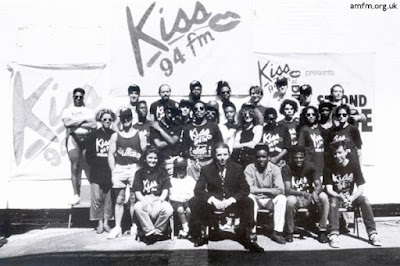
Alongside the revolution in television broadcasting, a similar battle of the airwaves is being waged on the radio. Will this forever wipe away the narrow choices offered by existing stations? Or is it possible to have faith in a revolution being waged from Downing Street? Grant Goddard examines the background to the first franchise application in London and looks at the way ahead for both winners and losers.
It was a little after 6am when Gordon Mac made his first phone call to the Independent Broadcasting Authority [IBA]. This was the long-awaited day when it would be announced whether his station ‘KISS FM’ had won the new London radio licence. But, despite an assurance that someone would be at work in the IBA’s Radio Division at this time, a recorded message merely told him to call again during normal office hours.
Mac was bursting to know whether the last seven month’s work making a huge written application to the IBA had been a success. KISS FM had earned an enviable reputation as London’s best dance music station during four years of pirate broadcasting.
But transmissions had been stopped from December ’88, in line with the government’s demands, to try and win the single London FM licence advertised by the IBA.
Mac left home in a hurry and drove across town to the KISS FM office in Finsbury Park. The rail strike had already clogged the streets with traffic, leaving him too much time to ponder the outcome of this crazy licence lottery.
By the time he reached the office just after 8am, the day’s post had already been delivered. The embossed IBA envelope enclosed a two-page letter, but the second sentence said it all: “I am afraid the decision is, for you and your colleagues, a disappointing one.”
Thirty other applicants were opening similarly apologetic letters across the city, but there was one group who could now celebrate in style – ‘London Jazz Radio’ [LJR] had just won the first new city-wide music radio licence since ‘Capital Radio’ in 1973.
The IBA’s press conference that afternoon was a strangely defensive affair. There were not many questions about LJR, but plenty of time was spent discussing why KISS FM had failed to win. Though the IBA refused to elaborate on the relative placings of the 31 losers, KISS FM was definitely in the short-list of five or six, and most probably the runner-up.
The awkward sensitivity shown towards KISS FM’s rejection reflects an awareness that they were certainly the public’s choice for a new London station. KISS FM was the only applicant to have already established a strong awareness among Londoners of its name, its music and its presenters.
The recent success of KISS FM team members Coldcut, Jazzie B, Richie Rich and Derek B in the pop charts has confirmed the station’s role as an important catalyst in the growth of home-produced dance music.
A further embarrassment was caused as this affair was the second occasion in recent years when a carrot has been dangled in front of pirate broadcasters to induce them to quit the airwaves. And the second time the carrot has been unexpectedly pulled away at the last minute.
The first voluntary pirate shutdown happened in 1985 when the Home Office encouraged them to apply for experimental community radio licences. Then, after lengthy prevarication and the receipt of 286 applications, the plan was abandoned.
The second carrot was offered last year with the unveiling of the IBA’s ‘incremental contract’ scheme for 21 new stations. Only those pirates who quit the airwaves before 1 January 1989 would be allowed to apply, so several stations (including KISS FM) duly complied and shut down. So now that the London licence has been awarded to a wholly non-pirate group, it was hardly surprising to see yet another carrot pulled out of the bag and shoved in KISS FM’s face.
“KISS FM put in a very strong application,” admits Peter Baldwin, the IBA’s director of radio. “IBA members felt very strongly that there were a number of applicant groups who could have been offered a contract, and we are seeking the government’s agreement to release additional frequencies so we can broaden the offers to these applicant groups.”
So KISS FM could be given a licence soon as a sort of prize for runners up?
“One has no idea where KISS FM will come in that,” says Baldwin, “but I’m bound to say that, given the government’s attitude towards pirate broadcasting, I think it would be imprudent for anyone to go back on the air if they have an aspiration towards broadcasting [legally].”
But this third carrot sounds equally precarious if it depends on the IBA’s success in evincing government agreement to more stations.
“Two more FM frequencies could be available in a short space of time – six to nine months,” explains Baldwin. “It would be for the government to decide. The IBA’s view is ‘should the listeners of London who haven’t got certain genres of broadcasting have to wait 18 months for that moment to arrive?’”
So the message to KISS FM is: sit tight, don’t do anything stupid (like return to piracy) and, some day soon, you may yet win a licence if we can persuade the Home Secretary of its political expediency.
Back in the KISS FM office, the disappointment of not winning is evident in the grim faces of a small group of station staff and presenters who are answering a stream of phone calls from well-wishers and listeners wanting to know the outcome. Three bottles of champagne sit unopened on the corner of Gordon Mac’s desk, where they remain unnoticed for the next week.
Mac himself is busy supplying quotes to enquiring journalists and does a live phone interview on the BBC London station ‘GLR’ with sympathetic soul DJ Dave Pearce. Some members of the KISS FM team who are not so close to the sharp end of the operation are unenthused by the carrot consolation prize, but Mac understands the need for cautious diplomacy now more than ever.
Seven months have already been spent raising more than £1million in capital, and a five-figure sum has been sunk into the application procedure to date.
A carefully worded press release is prepared, expressing “extreme disappointment” that KISS FM did not win the licence, but backing the IBA’s demand for more frequencies to be allocated to further London stations. KISS FM’s campaign focuses on 104.8 FM which becomes free in November when ‘Radio 1’ vacate their temporary London channel.
KISS FM presenter Heddi still feels the need for more direct action to satisfy the dozens of listeners who have phoned up asking what they can do to help. Over the next weekend, she visits several London clubs and solicits more than 3,000 letters of support addressed to the Home Office demanding the release of further frequencies for stations such as KISS FM. Gordon Mac delivers them personally to Douglas Hurd’s office exactly a week after the IBA’s fatal announcement. No acknowledgement or response is returned.
Mac seems to be treading a fine emotional line between huge personal disappointment at the outcome of several years’ hard work and cautious optimism that a licence still remains within the realms of possibility.
“Whether it takes three months or three years,” he says to GLR, “we will carry on campaigning until we are given the chance to be a legal radio station in London.”
In a more salubrious part of town, champagne bottles are being put to good use. London Jazz Radio’s nine-year campaign for a licence has paid off handsomely, particularly with its development of an all-party parliamentary lobby to argue the merits of its case.
The station’s founder, David Lee, is a 59-year-old jazz musician whose distinguished career has included TV themes, jingles and the writing of Peter Sellers and Sophia Loren’s 1960 hit ‘Goodness Gracious Me’. He wrote to the IBA suggesting the idea but received a faintly dismissive reply explaining (wrongly, in retrospect) that new legislation would be necessary before such a station could be introduced.
So Lee started on the road for the necessary legislation to be enacted. “I happened to bump into a guy I’d known but hadn’t seen for over 20 years, who was an amateur drummer but also a member of the Gilbey’s Gin family and working as a board member of Grand Metropolitan Hotels.” This was Jasper Grinling, ex-managing director of International Distillers, ex-director of corporate affairs with Grand Met, and now chairman of LJR.
“He happened to know an MP by virtue of his high rank,” continues Lee, “so we asked him and, in a very short time, we had a 14-strong all-party group. I call it my ‘Parliamentary Jazz Band’. Based upon that parliamentary support, we felt we could start to move. We would literally have got nothing without it. It allowed us to get the ear of people of reason.”
The MP Bowen Wells is now a director of LJR, as is Lord Rayne, ex-chairman of London Merchant Securities plc. Fellow shareholders include Lord Colwyn, Lord Dormand, Earl Alexander of Tunis, Viscount Portman and four other MPs – Jim Lester, Tom Pendry, John Prescott and Nicholas Scott.
The “people of reason” Lee reached included the Home Secretary himself. Before the award of the licence, Lee admitted: “I have great admiration for Douglas Hurd and, if it hadn’t been for his understanding, we wouldn’t be in the position we are today.”
“He was one of the first people to realise that it is quite wrong for a place the size of London not to have a station to represent so large a minority. He realised it and made sure those ‘people who know’ realised it.”
Indeed, Hurd on several occasions cited a London jazz station as an example of the new type of radio service he was intending to introduce. In retrospect, this should have been observed as an omen that parliamentary lobbying had already proven effective, long before the contract for the new London service was advertised.
The IBA are understandably keen to stress it was their decision to award the licence to LJR, based upon their assertion that the station will cater for a wide variety of musical tastes. Paul Brown, the IBA’s head of programming, explains: “LJR is a jazz radio station but, in assembling their application, they did a lot of research which told them that an audience would prefer to have a jazz radio station that provided a wide spectrum of jazz including, for example, Afro-Caribbean rhythms, salsa and also some of the big band performances.”
The station’s research showed that 41 per cent of those adults sampled liked to hear jazz on its own, while 63 per cent preferred to hear it mixed in with other styles of black music. But LJR’s own programme plans actually reject these findings and propose a fairly narrow jazz-dominated music policy.
A computerised playlist system is planned which will schedule one Afro-Caribbean record every two hours, one “boogaloo/soul” record every two hours, and one R&B record every 12 hours. Hardly a great concession to broader tastes.
Yet the IBA insist that LJR’s intended schedule also include “a good range of music styles derived from and related to jazz, including big band music, vocal standards, R&B and forms of Latin American jazz.” This statement is inconsistent with LJR’s own description of their output as “20th century jazz and jazz influenced music” in their ‘Promise of Performance’ – the legally binding statement of their programme plans.
Selecting such a specialised music station would have proven a hard decision for the IBA to defend, particularly when other applicants such as KISS FM were proposing to integrate jazz alongside many other styles of music. So have the IBA now insisted that LJR adopt a more catholic music policy in order to make their choice more politically acceptable?
“We are specifying that there must be a broad spectrum of output,” says the IBA’s Peter Baldwin, “and therefore what LJR accept will be a Promise of Performance that the IBA will write for them and not necessarily reflecting exactly what they applied for.”
Confidence in LJR’s ability to incorporate diverse and newer styles of ‘jazz-influenced music’ is not instilled by the station’s choice of senior staff. Apart from the presence of DJ Gilles Peterson on the board, the average age of the other nine directors is 56.
All this political manoeuvring is pretty galling for the unsuccessful bidders for the licence, who see accommodations being made for LJR’s shortcomings and the IBA adopting a defensive attitude towards their choice of winner. Several applicants made a positive commitment to jazz programmes alongside other neglected forms of music. KISS FM had already enrolled Gilles Peterson as a member of their own jazz presentation team.
When LJR comes on-air in February [1990], the proof of their commitment to these diverse music styles will be evident from their first day’s programmes. In the meantime, KISS FM can only wait for a Home Office decision as to whether additional frequencies will be allocated to further London stations. The KISS FM team will not return to pirate broadcasting, but will continue to campaign for the right to have a legal dance music station in London.
A week after the IBA’s announcement, Gordon Mac called a meeting of KISS FM’s staff and presenters to explain the whole situation. There was righteous indignation among many of those present that, once again, the government had pulled a fast one and made empty promises to the pirate community, while at the same time rewarding their own friends.
There were predictions that pirate activity in London would increase as a consequence of general ill-feeling towards the authorities. There was even an undercurrent that KISS FM had been duped by the second carrot-on-a-stick and would be foolish to wait for the outcome of a further open ended half-promise. Several members of the KISS FM team were absent from the meeting. Jonathan More and Matt Black (alias Coldcut), Hardrock Soul Movement, Jazzie B and Norman Jay were all in New York attending the ‘New Music Seminar’. It’s a dreadful irony that, while many of the individuals involved in KISS FM’s championing of British dance music have recently reaped huge popular success, the station itself is now off-air and still waiting for its day to come.
Last Monday, Home Secretary Douglas Hurd finally agreed to licence two more London-wide FM radio stations. After taking legal advice, the IBA has determined that it must publicly advertise these two new contracts, inviting bids from previous applicants and new groups by a November deadline. KISS FM will be one of more than 50 likely applicants, and the outcome will be announced by the end of the year.
The writer is a supporter of KISS FM’s campaign to secure the new London waveband.
[First published as ‘Kissed Off’, New Musical Express, 26 August 1989, p.31]
[This was a small part of the bigger story recounted in my book ‘KISS FM: From Radical Radio to Big Business’ about pirate radio, the station’s subsequent licence win and successful relaunch]
May 15, 2025
Students! Get Up, Get Into It, Get Involved : 1976 : Durham University
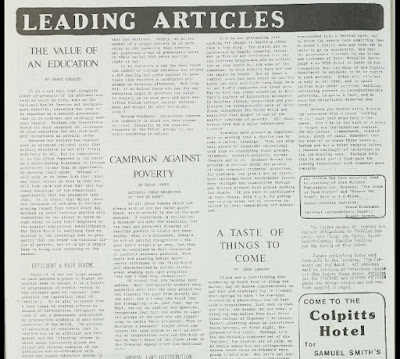
It is a sad fact that, alongside other by-products of the affluent society in which we live such as the National Health Service and Unemployment Benefit, education has come to be regarded as a natural phenomenon that is in constant and seemingly endless supply. Perhaps our forefathers would not have regarded the existence of ‘free education for all’ with such dull acceptance as prevails today.
Because our society has reached such an advanced cultural state that primary education is not only freely available to all, but is compulsory, it is too often regarded by the youth as a never-ending hindrance to leisure activities rather than an opportunity to develop their minds. Perhaps it will only be in later life that those who leave school as soon as they can will look back and wish that they had taken advantage of the educational opportunity that was presented them then. It is ironic that, whilst there are thousands of children in Britain playing truant every day, mothers in Latin American ghettos sell themselves on the street to raise enough money to send their daughters to the nearest educational establishments. The ‘Third World’ is realising that education is the sovereign road to prosperity that can break the vicious circle of poverty, but it is not a simple task to bring such schooling to the masses.
Those of us who are lucky enough to have secured a place in higher education seem to accept it as a natural progression of events leading to the ultimate goal of ‘success’ (and possibly the capitalist ideal of ‘wealth’). To be able to choose from a vast range of courses offered by dozens of universities throughout the land is not a phenomenon encountered by prospective students in many other countries of the world. The process of selection of candidates that is carried out in an efficient and fair manner and the ‘clearing’ scheme by which spare university places are filled are shining examples of the precision and co-ordination with which our higher education is planned. The fact that even a student from a poor family background can enjoy a lifestyle of comparative luxury is a credit to society that can never be emphasised enough. The constant preoccupation of the poor as to how they will be able to afford next week’s meals can be eradicated, so that enthusiastic involvement with academic pursuits can become a pleasure they may never have experienced before. These are the people who realise the full value of education, and these are the ones who will seek to learn something new every day. But how many of us idle away our time whilst taxpayers have to continually contribute more and more to meet our expensive whims? Should we not at least show our gratitude towards a society that has given us a ‘song for the asking’?
Durham University is not simply a degree factory where one can walk in with three A-levels and march out a few years later with a BA or BSc that is respected the world over. Durham University can only be what its students make it; but how many are prepared to make enough effort? It seems that, although students were quite willing to hand over innumerable subscription fees on ‘Societies Morning’, few feel obliged to attend society meetings and functions to which they are entitled. Surely an active member of a single society is of more value to the community than someone who possesses a wad of membership cards in their wallet that never see the light of day.
It is certainly a sad day when twice the number of college students who attend a Junior Common Room meeting are quite content to pass their time watching a television programme on Saturday afternoon. How long will it be before those who pay for our education begin to question our value to society as we seem more and more satisfied to sink into our insular environment and forget the real world outside?
Durham students! Contribute towards the community in which you have chosen to live! Education is the greatest treasure in the world: accept it, but offer something in return.
[First published as ‘The Value of Education’, Palatinate #299, 2 December 1976, p.4]
[My first published writing, a confused reaction after having arrived from a struggling one-parent family at a university unexpectedly 95% filled by privately educated toffs who mostly demonstrated scant interest in anything beyond their social lives.]
February 9, 2025
Why are Canadian radio station audience data a state secret? : 2000 : BBM Canada
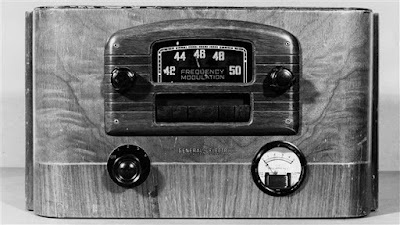
Letters to the Editors, Marketing Magazine, Toronto
Dear Sirs
I am a radio programming consultant based in Toronto with twenty years’ experience in the industry. My work has created successful commercial radio stations in the UK, Russia, Hungary, Latvia, Czech Republic, Estonia & Lithuania. When I start a new project in a city, the first thing I do is contact the designated agency for media ratings. On every occasion, agency staff have always been very happy to share their data with me and are always pleased to discuss their findings with a fellow professional. Some agencies have even produced custom reports to help me better understand their media market. They recognise implicitly that we are both working towards the same goal – a wider understanding of audience research data will produce a more efficient medium that delivers bigger audiences to more satisfied advertisers.
The story could not be more different in Canada. I called the Bureau of Broadcast Measurement (BBM Canada, founded 1944) this morning and was surprised to learn that it offers no public access to documents at its offices, and expressly forbids public access to any survey less than a year old, even to industry professionals such as myself. I was given two options: subscribe to BBM at a cost of over a thousand dollars; or consult back issues of surveys at Ryerson University. I had visited Ryerson earlier this week, where the latest data on the shelves is 1998 (prehistoric in media terms) and I was told by the Librarian that the University's contract with BBM expressly forbids access to any data more recent.
I am at a complete loss to understand why the broadcasting industry in Canada funds BBM for research purposes and then does its utmost to hide the results. The radio industry may whine about declining audiences but, unless consultants such as myself are permitted to read, understand and interpret the latest market data, how can we make any positive contribution to our industry? I can call the Audit Bureau of Circulation in Canada, enquire about magazine readership, and be bombarded with reams of statistical data. But the radio industry in Canada – nothing!
In the UK in the 1990’s, I made a modest contribution to the development of radio research by tabulating and publishing the first Arbitron-style radio station rankings for every major market in the country. Such basic, easy-to-understand information seems to be impossible to collate in my own backyard, even for professional purposes. Or is that the way Canada's cosy little media cartel wants it? And how does such a policy help grow the broadcasting industry in the long run?
Yours sincerely
GRANT GODDARD
11 August 2000
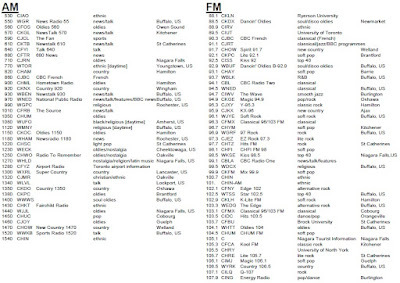
January 28, 2025
The great brains robber fearful his collar will be touched : 1991 : Gordon McNamee, KISS 100 FM
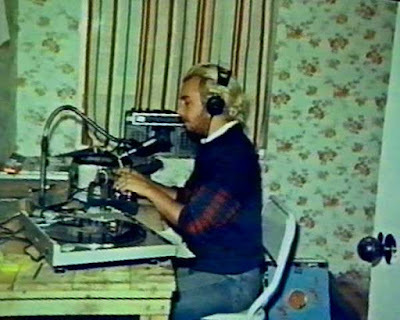
“If this gets out, we’re screwed,” my boss told me. Actually, I have paraphrased because at least one expletive was guaranteed in this man’s every sentence.
He looked very worried. I was baffled. I had absolutely no idea what he was talking about.
“I don’t just mean ME,” he added in response to my bafflement that maybe he mistook for insouciance. “I mean YOU too, everyone in this building, this entire business. We are all f……” I will stop there. You can probably guess his favourite expletive.
He thrust the inside pages from a Sunday tabloid newspaper across his desk and indicated I should read. It was a large news story about an apparently notorious drug dealer involved in sundry nefarious activities who had just been nabbed by ‘the law’. I had never heard of him. I was still completely baffled.
“Without these people, we wouldn’t be here,” my boss explained with deliberate ambiguity. I ran a lightning-fast Poirot-style drawing room denouement through my mind:
Surmise the newspaper suspect is genuinely criminalI had never met himI had done nothing criminalMy boss is evidently freaking outMaybe HE is mixed up with this criminalMaybe HE has done something illegalSomething SO illegal that it would close down our business which, Hercule realises, is licensed by the British government.Oh dear. Will I still have a job tomorrow?
This was not how I had anticipated my regular Monday morning eight o’clock drop-in to my boss’ penthouse office. He looked more than worried. He looked scared stiff. As if the Metropolitan Police might come knocking on his office door within the next hour. I had recently watched horrified as certain of his sacked employees had been frogmarched out of the building by a security guard upon this man’s cruel orders. Perhaps the boot was about to pass to the other foot, this time with the addition of handcuffs and a blue flashing light outside on Holloway Road.
He took the newspaper back from me, turned it back around and sat there in silence, staring at the article. He chose to elucidate nothing further for a full minute, so I bade him farewell, got up, closed his door behind me and returned to my own office downstairs. It was the strangest start to my week. I was left just as baffled. My boss never said another word to me about this incident. He did not need to. Its significance was betrayed by his changed demeanour from that day onwards. Gone was the happy-go-lucky faux bonhomie he had always oozed. From now on, he would behave as if a gunman might burst into the room and shoot him at point-blank range.
In previous years, it had been evident to those of us working for London pirate radio station ‘KISS 94 FM’ that there were dodgy things going on under our noses in its open-plan Finsbury Park first-floor office. Unlike its competitors who mostly attempted 24/7 radio services, our station had only broadcast from Friday to Sunday. How come rivals had been regularly raided and shut down by the government, or sometimes by their enemies, whereas KISS had been so rarely, if ever, forced off-air? Press articles had regularly alleged that violence, industrial sabotage and criminal activity were rife within London’s pirate radio business. Some involved criticised this as the perfect fabricated excuse for the authorities to raid illegal stations, close them and prosecute their operators. But was there some fire behind this convenient smokescreen?
Every week, KISS had held numerous rammed club nights in venues across London, collecting the door money in cash. Hundreds of pounds, thousands on busy holiday weekends, would be counted out and bundled up on an office desk, to be dispatched out the office front door in the hands of station co-founder Gordon McNamee’s personal assistant, Rosee Laurence. Those substantial cash revenues did not appear to be reflected in the subsequent published accounts of McNamee’s company, Goodfoot Promotions Limited. Where that cash went I never knew. I had realised that, despite my training in economics and accountancy, it was best not to ask or get involved in the financial labyrinth of this illegal radio station.
McNamee regularly described his business style as “ducking and diving”, defined by the Cambridge dictionary as “the action of cleverly doing everything you can in order to succeed, or to avoid a situation, even when this may not be completely acceptable or honest.” For those familiar with the popular 1980’s British television sitcom ‘Only Fools and Horses’, McNamee would have fitted right in with its cast. His gift was his East End gab. He could persuade almost anybody to do almost anything … that would ultimately benefit himself. Running one of the dozens of London pirate stations had at least corralled a useful boundary to his ruthlessness. However, that limitation evaporated once he hit the radio jackpot.
What happened next was all my fault. After KISS FM’s first attempt to win a legal London radio licence had failed, McNamee slumped into lethargic depression and paralysed inaction. I stepped up to the challenge of initial defeat by instigating a lobbying campaign with co-worker Heddi Greenwood to persuade the government to advertise further radio licences (which succeeded) and, then, by managing and writing a second licence application (which succeeded against all odds). To achieve this, I had to make the difficult decision to sacrifice my job editing a new monthly black music magazine ‘Free!’ that I had just founded. My motivation was my long involvement in London pirate radio during two decades, since when I had dreamt of Britain’s first legal black music radio station. Eventually, I made that happen.
However, once the licence had been won, McNamee’s demeanour changed significantly. Newly attired in a sharp Paul Smith suit and shirt, he set out to hobnob amongst bigwigs with money whom he convinced that the station’s application had succeeded due to HIS entrepreneurial skills. Although he had only five GCSE certificates to his name (amongst them woodwork and technical drawing) and was barely literate, having “bummed out of school most of the time”, his ego started to believe the ‘rags to riches’ story that press profiles were painting around him. Prime Minister Margaret Thatcher’s 1980’s propaganda promised that any East End barrow boy could ‘get rich quick’ through hard work in London’s financial and corporate sectors. It was the era of ‘loadsamoney’ when huge advertising billboards posted around London promoted local talk radio station ‘LBC’ with the slogan ‘GREED IS GOOD’ in massive letters.
Whereas pirate era meetings had previously been held within our open-plan office, McNamee now held them privately elsewhere with who knew whom and with outcomes unknown. He had always convinced the press that the pirate KISS FM was a ‘collective’ of its DJ’s even though it now seemed to operate more than ever as his fiefdom (KISS FM DJ Jazzie B’s “be an asset to the collective” lyric proved similarly shallow). Secrecy became endemic. McNamee’s domestic arrangements had always been sketchy, which I had presumed was the product of his ‘wife plus mistress’ private life. But he had progressed from being cagey to obsessively clandestine.
Weeks before the now legal KISS 100 FM launched, McNamee insisted I visit his new home for a Sunday business meeting and lunch. However, its address was apparently so confidential that I could only be told it by phone as I stepped into a taxi at the start of my long journey from one end of London to the other. I had to swear on my life that I would never share its location with anyone. Upon my late arrival (after the taxi ran out of petrol), I entered an expansive Edwardian house in Dulwich filled with expensive stuff, including huge blown-up photos of McNamee on walls throughout. The place was a shrine to both the man’s ego and the decadence favoured by the nouveau riche. I had to hide my disgust, as I had yet to be rewarded for my work winning KISS FM its licence. I was living in a damp suburban top floor flat without central heating.
It was galling to see McNamee showing off such opulence even before our new radio station had launched. Where had he got the money to buy this home? Where had he got the money to buy £90,000 of share capital in the newly created ‘KISS FM Radio Limited’ company that would be operating the licence? No explanations were offered to any of us who had been involved in our supposedly ‘collective’ enterprise – now HIS business – before it had won the licence. I was promised rewards (shares, a bonus, an immediate salary) for my efforts winning the station, none of which McNamee honoured. He was proven to be a cold-hearted liar in his treatment of me. I am certain I was not the only one.
I never knew if the Monday morning ‘criminal’ incident in his office was connected somehow to these apparent financial shenanigans that had suddenly made him ‘rich’. What I do know is that McNamee was never the same again. After Easter, he started to work a bare minimum of hours at the station. My office overlooked the private car park to the rear of the building so that, every morning, I would hear him arrive at precisely nine o’clock in the morning and then leave at precisely five o’clock in the afternoon. During the day, McNamee was no longer seen around the building. Apart from his presence at meetings, I rarely saw him to talk to any more. There was a lot of whispering around the building that things were going very badly for him.
Whenever I had to visit the top floor to see McNamee in his office, he would usually be sat behind his desk, doing nothing in particular. Often not, he would be staring at the latest share prices on the Teletext pages of his huge colour television. He seemed obsessed with the notion that he was some kind of entrepreneurial whiz-kid. He even started comparing himself in conversation to Richard Branson, the boss of the Virgin empire. Often, I would find him listening to old soul or jazz-funk records in his office, rather than to KISS FM. It seemed as if he was barricading himself into his corner office on the top floor, trying to ignore the realities of the radio station that were going on around him.
He clearly lacked the management skills to make the station a successful business, having appointed as departmental managers ‘outsiders’ who failed to understand our unique radio product and who all failed to meet their targets. I was the only ‘insider’ to head a department and became the only manager to meet my target (one million listeners per week by end of Year One) some six months early. Consumed by his own failings, I could see McNamee grow to despise me for my success. At one stage, he even told me: “Do you know what I hate about you, Grant? You’ve got the answers to every bloody question. And they are always bloody right.”
What he failed to grasp was that my expertise was derived from education, training and experience. I had not been born on a council estate with it. Unlike him, I had been involved in the radio business for two decades. Unlike him, I had implemented a (then) radical music policy that had turned around the fortunes of a large British commercial radio station (Metro Radio, Newcastle) a decade earlier. Unlike him, I had managed people since the 1970’s. Unlike him, I may not have possessed the gab, but I had a range of skills that were necessary to launch a successful radio station from scratch … and that is exactly what I did. Inevitably, having managed the station to ratings success, I was deemed no longer necessary to McNamee’s increasingly paranoid behaviour and was ejected without an ounce of gratitude. Then he slandered me in a national newspaper, bizarrely accusing ME of ruining HIS radio station!
Jump forward to June 2024. The same Gordon McNamee was honoured with the Most Excellent Order of the British Empire for “services to music”. It seems totally appropriate that it was bestowed upon him by the most corrupt, dishonest self-serving British government observed in my lifetime, run by a Prime Minister and staff convicted on 126 occasions of breaking COVID lockdown laws they themselves had legislated. Many current Tory politicians still idolise Margaret Thatcher and the ‘policies’ that helped her dominate 1980’s British politics. In 2022, Prime Minister and former Goldman Sachs banker Rishi Sunak had even asked on camera a homeless man if finance was a business he would “like to get into”, a scary echo of that Thatcher propaganda.
During my media career, I have had to work for a clutch of bosses whose activities appeared somewhat non-legal, several of whom were eventually prosecuted, two of whom were sent to jail. That is a sad reflection on the calibre of people who rise to the heights of British business where ‘meritocracy’ seems to have been labelled a dirty word … by those who are already installed on top.
[See also ‘KISS FM: From Radical Radio To Big Business: The Inside Story Of A London Pirate Radio Station’s Path To Success’ by Grant Goddard, Radio Books, 2011, 528 pages]
January 11, 2025
Kick archaic studio-bound public radio production out into 21st century public spaces : 2011 : BBC Radio
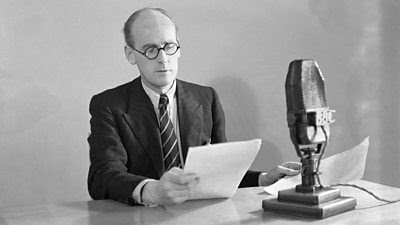
Technological advances made during the last two to three decades have changed our world almost beyond recognition. Everyone now has the ability to be almost permanently 'connected' to a world beyond their immediate personal space.
Has BBC radio fully embraced the benefits of these technological advances? From an external perspective, the answer appears to be both 'yes' and 'no'. BBC radio seems to have implemented new technologies less obviously than BBC television. Yes, BBC radio programmes and stations now have an online presence, receive e-mails and tweets, and distribute their output live and on-demand via IP. But no, the basics of radio production have changed very little beyond a conversion from analogue tape to digital hard-drive storage.
In the 1920’s, a male radio announcer would sit in a BBC radio studio, dressed in a dinner jacket and reading a pre-prepared script. In order to be interviewed, guests would have to physically come to the studio. Everything had to be broadcast live, as there was no technology to include 'actuality' from beyond the studio's confines. All the news and information had to be filtered through the on-air presenter. Listener involvement was limited to letters submitted, selected, edited and read on-air by the presenter.
Surprisingly, the radio production format has changed little in the interim ninety years. Presenters still sit in studios filled with expensive radio hardware and they still act as filters for the information that flows into the studio. Only three substantial changes are evident: recording systems have allowed interviews and actuality to be incorporated into programmes, and a programme itself to be time-shifted; phone-ins have allowed listener voices to be put live on-air via the telephone; and BBC reporters can be incorporated live into programmes via ISDN or IP from around the world. All these developments were pioneered by the BBC.
If we look at BBC television, we see that an increasing amount of content broadcast on the 'BBC News' channel comes in the form of photographs, poor quality mobile phone video (viz the 'Arab Spring' in Syria), eyewitness reports by phone line and Skype video/audio interviews supplied by the public from their offices or homes. In the current jargon, much of this could be called 'user generated content'.
However, in radio, this revolution has simply not happened. When did you last hear a piece of audio on BBC radio that had been recorded and submitted by a member of the public? Never? In radio, public participation in the output still remains limited to content initiated or filtered by the production team. A member of the public will be asked to connect to the studio for a formal interview with a presenter either live in the studio, from a BBC contribution studio or via a phone line. Or a reporter may take a portable audio recorder out to interview a member of the public on location and the outcome is edited before transmission into an audio 'package.'
The result is that, just as in the 1920’s, what we hear on the radio has still been filtered through the programme presenter and producer, so that the resulting programme is delivered from the confines of a cosy, air-conditioned studio. Radio is still largely produced in a vacuum that is far apart from the real world. Of course, there are obvious exceptions such as 'From Our Own Correspondent' and 'Question Time.' But these remain exceptions.
The continuing reliance within radio upon the hardware-equipped studio is particularly hard to understand when digital audio equipment is smaller, lighter, more portable and cheaper than its analogue ancestors. A radio programme can be produced, mixed, edited and broadcast from a basic laptop computer using software-based technology rather than considerably more expensive hardware. In this sense, radio should by now be far ahead of television, where digital equipment remains expensive, complex and still requires substantial bit rates and data storage for broadcast quality.
These incredible technological advances in radio production have been well understood and seized upon by people outside the BBC who do not have privileged access to expensive hardware-based recording studios. In their thousands, these people are making their own radio programmes (‘podcasts’) and creating their own online radio stations. The technology has filtered down so far that even a local primary school has its own radio production studio, linked to a low-power FM transmitter on the school's roof so that children can listen on ordinary radios to the programmes they make.
London is one of the most exciting cities in the world. Yet, when I listen to 'BBC London 94.9 FM', I do not hear that excitement reflected much in its output. What I do hear are presenters sat in hardware-based studios, talking with guests they have invited there or talking via phone lines to selected contributors outside. What is sorely missing is 'actuality.' News stories are often reduced to 'packages' that can be inserted into hourly news bulletins. Yet the technology already exists (smartphones, IP, 3G) so that the hundreds of news stories that happen in London each day could be put to-air quickly using actuality live or 'as-live' recorded by either BBC reporters or the public.
Existing technologies could be implemented to create an exciting news and information driven radio station for London that more closely reflected life in the capital. It would entail taking risks, but it is only through risk-taking that innovation will happen. BBC London's share of radio listening in London is only 1.4% and the station reaches only 5% of the population each week. Licence Fee payers could be better served by a local radio station in London that used new technologies to create an audio soundtrack that reflected their lives in this city. Such opportunities to use new technologies to change the face of radio are being missed, or being left to television to implement.
I lived in Toronto for five years and the city's only independent television station, 'CityTV', offered one of the most impressive uses of new technology I have ever seen. For a start, the station did not have traditional TV studios. News programmes were presented by anchors perched on the corner of their own office desks. The nightly one-hour local news programme was filled to the brim with reports from a small team of one-person 'videographers' who whizzed around the city all day and recorded every available story using a single handheld camera. Sometimes the quality was not great, but the content accurately reflected the life of the city much better than any other local medium in Toronto.
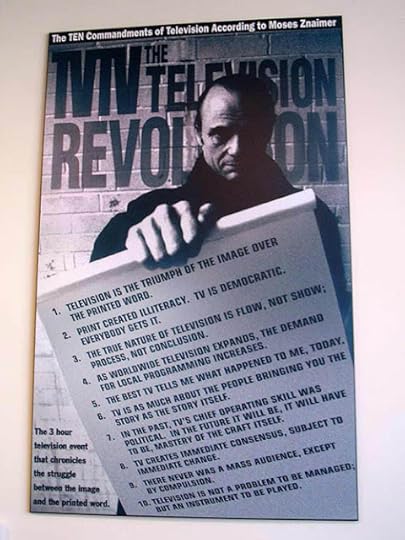
At CityTV, the weekday morning show was presented from the station's ground floor foyer. Cameras, lights, cables, production staff were all left in-shot, as were the people on the busy street outside and casual visitors to the station's offices. CityTV's owner, 'media visionary' Moses Znaimer, called this infrastructure "the streetfront/studioless television operating system" and it worked fantastically. Every Friday evening, the same foyer was turned into a free nightclub that was televised live for several hours with DJs, visiting music acts and short interviews. Admittedly, CityTV's output was sometimes chaotic but it used cheap, lightweight technologies to successfully break down the barrier that had existed previously between formal, studio-limited programmes and their audiences. The people of Toronto felt truly connected with CityTV because every city dweller knew the location of its downtown building and could wander in, even during its live shows.
I had marvelled at CityTV's bold use of cutting-edge technology fifteen years ago. And, since then, technologies for television have advanced much further. But it is the medium of audio where even more fundamental breakthroughs have taken place. The ability to use a smartphone, a laptop or a cheap audio recorder to record perfect digital sound quality in WAV format has opened up the possibility to produce content for broadcast much more significantly than in television. Yet, from the outside, there seems to be no strategic vision to implement these technologies within the BBC in order to change the way in which radio more pro-actively involves itself with the world outside its radio studios.
Individual BBC reporters are doing amazing things with new technology. Nick Garnett provided live interviews for 'Radio Four' about the outcome of the last election from a moving tram in Sheffield using only his smartphone installed with the 'Luci Live' application for broadcasters. His personal website demonstrates in videos his evangelism for these new technologies. He contrasts his ability to produce live coverage of the recent Salford/Manchester riots safely using only his handled smartphone with the impossibility twenty years earlier when a high-tech van was necessary, even for a short live report, and the job of holding the microphone remained the responsibility of a BBC Studio Manager.
At the heart of technological change is a necessary accompanying change in working practices in many parts of BBC radio. Whilst television underwent fundamental change when it was transformed into 'BBC Vision', the radio infrastructure has remained much the same. Whilst BBC television has been mostly casualised by freelance staff, radio remains dominated by full-time employees. Although BBC television has stiff competition from commercial stations, BBC radio attracts the majority of listening (54% currently) and its share continues to grow. The grave danger is that complacency in BBC radio from high ratings can stunt innovation.
Whilst there is no doubt that technological innovations have been successfully incorporated into current working practices within BBC radio, it is a much greater challenge to incorporate the disruptive influences of those technologies in a way that forces change in current working methods. For example, at present, producers and editors of radio programmes set the agendas of programmes themselves and then seek to fulfil those plans by inviting 'talking heads' and commissioning 'packages' to make their points. This is a demand-led production system, working from the demands of the producer.
However, in a world where there are already hundreds of pieces of audio content available to choose from to make a programme, the production system could become more supply-led. The editor would use a mix of commissioned pieces and the best or most appropriate of what already existed from BBC contributors or the public. In fact, the radio editor would become more like an editor of a newspaper, selecting from what content already existed, rather than commissioning every item from scratch.
If the thought of including 'user generated content' from the British public in network radio output proves alarming, it is worth remembering that there are dozens of media courses up and down the country whose students would love to add some BBC radio contributions to their CVs. There are also 300 community radio stations that have an existing ‘Memorandum of Understanding’ with the BBC to share content in both directions. Yet BBC radio at network level does not seem to have reached out to the wider constituency of audio producers beyond its own staff and ex-staff. When I interviewed senior BBC network radio staff last year for a ‘BBC Trust’ report and asked why no audio was being recycled from BBC local radio, student radio or podcast producers, I was told that they would not meet the 'quality' threshold. Equally, you might ask why the Sony Award-winning 'Hackney Podcast' is not a regular part of BBC London's output.
This 'quality' barrier is an anachronism that remains in place in radio and yet seems to have been largely overcome in television. Within BBC radio, 'quality' is even used as a means to segregate one division's content from another's. In television, if the content communicates something newsworthy or significant, blurry mobile phone footage is broadcast. Yet, in radio, the audio quality often seems more important to producers than the content itself. This requires not so much a change in technology, as a change in attitudes and editorial policies that have not caught up with the technological possibilities.
A station such as 'BBC 1Xtra' should be an exciting and ground-breaking experience to listen to. Yet, on the occasions I have listened, its output has seemed hideously studio-bound and insular to me. There appears to be little difference between 1Xtra and 1920's BBC radio, as a presenter still sits in a hardware studio, but with an assistant who reads tweets instead of letters. During one show I heard recently, the presenter was reduced to bemoaning that he had left his lip balm at home, and a clip was used of musician interviews made days earlier backstage at an awards ceremony.
Surely a station such as BBC 1Xtra that is aimed at young people should have an immediacy and an incredibly 'live' feel to it that is able to challenge the speed of competing information sources delivered via the internet. 1Xtra should be overflowing with exclusive news, information and music, artists dropping in for short chats and 'actuality' broadcast live or 'as-live' that reflect the diversity of the British black music scene. Yet I do not hear this kind of excitement when I listen to 1Xtra. The station would be a perfect candidate to adopt CityTV's studio-less operating system, where it could operate from an open-door shopfront rather than from the remote bowels of a BBC office. It could even broadcast from different cities week to week, like an ever-travelling roadshow.
I have a particular interest in 1Xtra because, twenty years ago, I had launched 'KISS FM' in London as the UK's first black music radio station. Even then, I had used what few new technologies were available to make the programme content less studio-bound. I regularly sent one reporter out with my mobile phone (at a time when they were uncommon) and her interviews and actuality were put live to air using nothing more sophisticated than the phone's low-quality microphone. The audience loved that immediacy. Then, after work, I would take a digital recorder to London clubs and record the whole night's DJ set for subsequent broadcast. These technological innovations made KISS FM one of the most successful station launches of its time because listeners understood that the station was 'out there in London' rather than always studio-bound.
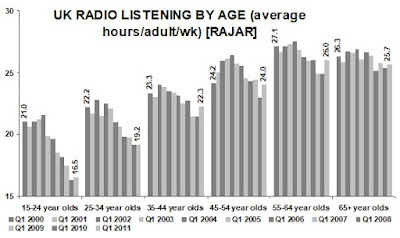
Let us be clear here. Radio needs to implement as many new technologies as possible in order to adapt and change what it can do if it is to remain relevant and valuable to its audiences. Although, in total, radio listening in the UK has reached an all-time high (partly as an outcome of the increasing population), there are some disturbing long-terms trends. Six years ago, 15–24-year-olds started to spend significantly less time listening to broadcast radio. More recently, 25–34-year-olds are also spending less time with broadcast radio. If this trend continues, part of an entire generation could lose the radio habit.
BBC Radio needs to compete for consumers' time with every other distraction out there – particularly the internet, games, social networking and video. To do that, radio has to re-invent itself so that it is exciting and entertaining for a whole new generation. That requires radio to respond to the disruptive influences of new technology, not in a defensive way, but to embrace change and to understand that, just as with other businesses, if you do not change and adapt with the times, your brand could easily die.
At present, the BBC's strategy for implementation of new technologies in radio could appear to be somewhat slow, scattershot and disjointed. What is needed is a joined-up roadmap to bring BBC radio firmly into the 21st century, a determined push to move radio beyond its 1920's production methods, and a programme to combat internal complacency and inertia through persuasion and education. The biggest enemy to such change often derives from the people entrenched in an organisation, not from the availability of technologies. In that sense, the imperative for change has to come from within.
The BBC has a long tradition of being at the forefront of new technological developments in radio. It is admired the world over for its innovation in the radio medium and the quality of its outputs. The biggest current danger is that, unless a strategy is developed for BBC radio that combines the implementation of new technologies with changing methods of radio production, the BBC's track record of innovation could be acceded elsewhere.
In our enlarged, globalised radio marketplace, it would be perfectly possible for Google or Microsoft to invest sufficient R&D seed money to develop a new style of radio that could set the youth of the world on fire (viz Facebook). Until now, the main threat to broadcast radio from the internet has been in back-to-back music applications (Spotify, Last.fm) which add no value to widely available pre-recorded music. However, compared to the visual medium, it would prove relatively cheap to add value to that audio content if you could identify the appropriate editorial that will appeal to a whole new generation as 'the new radio.' It is important that BBC radio faces this global threat by implementing innovation as a must-have-now rather than as a long-term objective.
Within the BBC, there are already plenty of staff embracing such change on an individual level. More than 300 BBC staff have signed up to Audioboo, a UK-based online exchange for short audio clips. Similarly, some BBC programme makers are contributing to PRX, a US-based online marketplace for both complete programmes and short audio clips. I understand that the BBC is currently developing its own in-house version of these sort of E-Bay's for audio content.
The imperative to centralise data storage of BBC audio so as to create an internal 'cloud' system for radio content provides the perfect opportunity to develop new production systems that can share content, both internally and from outside the BBC. The traditional 'silo' system, whereby individual radio programmes and individual radio stations have managed their own content resources, cannot be productive during a time when the Licence Fee produces pressures to share and consolidate resources as much as possible.
More than ever, in BBC radio, change is necessary. But change can also be very hard to make happen, particularly within large organisations. I would suggest that the task ahead is to develop an interlocking roadmap for radio technologies that embraces:
more agile content ingest, storage and accessibility (avoiding transcoding) radio production processes that focus on the intrinsic public value of content, more than its audio quality or source the evolution of radio studios from fixed hardware to portable software a plan for multi-platform distribution based on cost-benefit analysis and accurate usage data (RAJAR platform data are inaccurate) IP delivery of radio via frictionless technologies, reducing bandwidth through multicasting a focus on content availability, connectivity and 'searchability' the unlocking of BBC archive radio content an appropriate and future-proof metadata architecture for audio content distribution use of commodity software or collaborations with external suppliers wherever possible.The aim: to ensure that the connections between BBC radio and its audiences are maximised through available technologies, delivering content efficiently and easily wherever and whenever it is demanded.
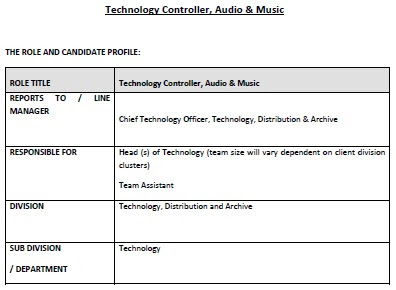
[In 2011, London recruitment agency Lonmoor invited me to apply for the vacancy of ‘Technology Controller, Audio & Music’ at the BBC. Following initial discussion, it was suggested I submit these ideas on paper, after which I received an email response: “We shall conclude our shortlisting process in the next week and be back in touch.” I am still waiting. It became the fifty-ninth consecutive BBC job for which my application was rejected.]
[Available as a download.]
December 29, 2024
I just looked around and he was gone : 1979 : Jerry Dennis, Palatinate editor, Durham University
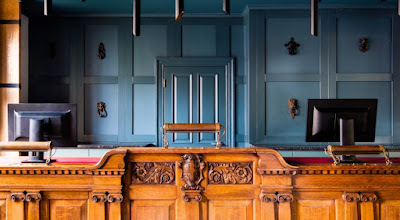
“I am here for the Accommodation Office, please,” I said with trepidation to the uniformed man behind the huge wooden reception desk in the lobby of the Old Shire Hall. On the front of the desk, elaborately carved nineteenth century working-class scenes from Durham’s coalmining industry seemed to clash with this building’s present users – high-flying academics and the children of Britain’s upper classes.
The man behind the desk looked at me with a suspicion seemingly reserved for the occasional long-haired student who ventured into his domain wearing crumpled denim clothes and platform shoes … like me.
“You will have to leave a message,” he eventually replied in a bored tone that conveyed the regularity with which he was required to offer such a response. He did not bother to elucidate whether the Accommodation Office was presently unmanned, temporarily closed or existed in any physical form. Instead, he gestured towards an open hard-backed ledger laid at one end of his mighty desk, beside which was a chained Biro.
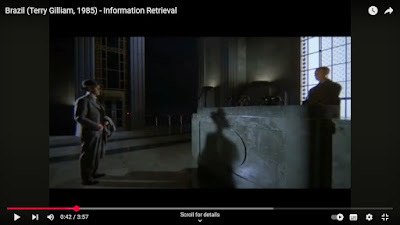
I was made to feel so small and insignificant in the foyer of that hugely imposing town centre monolith constructed in 1898 as the headquarters of Durham County Council but, since 1963, used as the administrative centre of Durham University. (Years later, when I watched Lowry approach the front desk of The Ministry of Information Retrieval in the movie ‘Brazil’, I instantly recalled my sentiment). I wrote in the visitors’ book that I was requesting information urgently about landlords presently offering accommodation to rent.
I was homeless, secretly spending my nights in a sleeping bag on the floor of an office in the Students’ Union building, Dunelm House. Student ‘digs’ around Durham were advertised but landlords were demanding rents way beyond my budget. Extortion proved no barrier to the 95%+ of undergraduates who had arrived from private schools, receiving only the minimum student grant from their local authority, but whose parents were sufficiently wealthy to uncomplainingly pay such rents through their noses. Some students I met lived in accommodation their parents had even bought for them as an investment within this English county so poor that miners’ cottages could be acquired for £1,000.
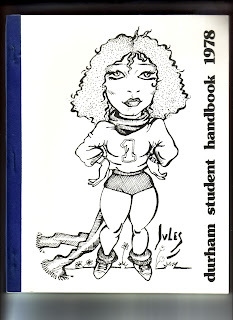
I was not amongst this privileged majority of students. Since arriving in Durham in 1976, a chunk of my full student grant from Surrey County Council and my vacation earnings had been diverted to pay the utility, property ‘rates’ bills and overheads of my family’s home in Camberley. After my father had deserted his family four years earlier and then ignored court-ordered maintenance payments, my mother had been struggling to raise my two younger siblings in austere circumstances. During my first two undergraduate years, I had opted for subsidised college rooms but then had been forced out onto the ‘open market’ by university policy. Additionally, I had waived my vacation earnings during the summer of 1978 by choosing to remain in Durham to edit (unpaid) the annual ‘Durham Student Handbook’ with the hope it might benefit my career in media. Whereas, the previous two summers, I had worked twelve hours a day, seven days a week continuously for two months in a basement office in Aldershot, maximizing available overtime to help fund my family’s expenses.
Weeks after having left my message for the university’s Accommodation Office, I received by internal mail sent to my college’s basement pigeonholes a photocopied A4 page listing about a dozen local landlords. This document was of no practical use, lacking basic, accurate and timely information that could have helped me. I wondered whether the university’s ‘Accommodation Office’ really even existed since Durham’s posh students scarcely appeared to require practical assistance when their parents were still organising their education. Who was the university’s ‘Accommodation Officer’ Catrin Prydderch-Jones, a 1977 graduate of Durham University with a 2:2 in music who had been appointed in September that year to the post of “Administrative Assistant in the University Office”?
I was not her only unsatisfied customer. In January 1979, a letter from archaeology undergraduate Jeanette Ratcliffe published in Durham student newspaper Palatinate had complained:
“Miss Prydderch-Jones sent out to students looking for accommodation next year a list of landlords and their respective houses and flats” that was “incomprehensible, grossly out of date and of little constructive use”“A considerable number of landlords no longer wished to be on the list and students who contacted them became the subject of their anger at receiving numerous phone calls a day enquiring about their property.”One listed house “according to the landlord has not been standing for six years”“What exactly does Miss Prydderch-Jones do to retain her position in the Accommodation Office?”“… I suggest she give up her position as Accommodation Officer”.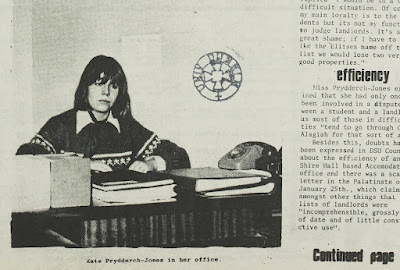
In a follow-up front-page article in February 1979, the student newspaper reported that “doubts have been expressed in Durham Student Union council [meetings] about the efficiency of an Old Shire Hall-based Accommodation Office.” It explained that “complaints about the way that the [Accommodation] Office is working led Palatinate to talk to Ms. Prydderch-Jones” who was pictured sat at a desk. Her quoted responses proved to be wholly evasive and she ended by assuring readers “there is no crisis at the moment about finding places to live!”, apparently oblivious to the notion that the high prices of available accommodation might prove a barrier for those students having to survive without parental support.
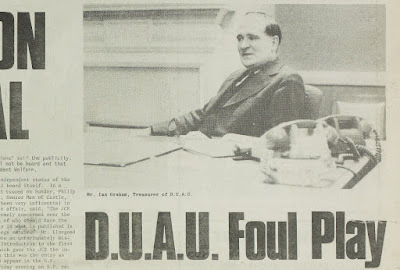
In the same issue of Palatinate that had published the letter from Ratcliffe, a front-page expose had criticised the financial management of the Durham University Athletic Union [DUAU], provider of the university’s “excellent” sporting facilities, under the headline ‘DUAU Foul Play’. Beneath a photo of DUAU treasurer Ian Graham sat at his Old Shire Hall desk, the article explained that the £38 annual ‘Composition Fee’ paid by the local government authorities of each of Durham’s 4,000 students was divided by the university between its athletic union, student union and college ‘Junior Common Rooms’. DUAU audited accounts showed that:
In 1977/8, 42% of the Composition Fee had been spent on sport, compared to the 18% national average (the DUAU share increased to 52% the following year)When Durham colleges’ expenditure was included, £20 of the £38 per head Composition Fee was spent on sport.DUAU accounts documented a surplus greater than £4,000 during each of the previous three years, a situation that “should lead to a cut in their grant, as showing a surplus is interpreted as meaning that too much money has been given”. Surpluses of £5,200 in 1976/7 and £10,000 in 1977/8 were said to have been allocated to “reserve funds”. Questioned about these reserves, Graham “evaded the fundamental points by talking at some length about the rather vague uses of these funds” which the article concluded “does not alleviate Palatinate’s concern[s]” which were:
“One of the complaints that the [government] Department of Education & Science is making is that there is not enough public accountability for student unions”“DUAU, by claiming large sums of money for their FUTURE but, as yet, UNSPECIFIED capital expenditure, is effectively avoiding any sort of accountability whatsoever.”Some of Ian Graham’s unverified arguments in the interview to justify DUAU’s dominant share of the per capita funding appeared bizarre:
“It is much easier for a student who has been actively involved in university sport to get a job”“Many parents have sent their children here because of its fine sporting reputation”“There was a correlation between the increase in good A-level results of Durham students and the growth and success of DUAU”.Confusingly, although DUAU was constituted as a student organisation, just like Durham Students’ Union, Graham was no student but rather the university registrar responsible for managing the entire institution’s administration. This would be like having a school principal in charge of its students’ council! It was no wonder that DUAU could appropriate the greater part of each student’s Composition Fee with impunity, to the detriment of the student union, because each year it was the university administration, led by the very same Ian Graham, that determined the division of funds. Conflict of interest or what?
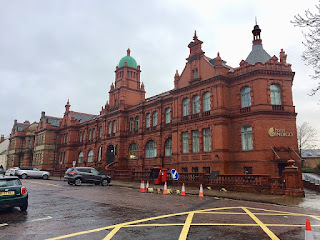
These separate anonymous front-page articles appeared in Palatinate within weeks, criticising two Durham University administrators, Catrin Prydderch-Jones and Ian Graham. However, a link existed between these two that had not been published. It was Graham who had appointed Prydderch-Jones to the accommodation job for which she appeared to be poorly qualified. It was also Graham who allegedly had invited Prydderch-Jones amongst a bevy of posh, female undergraduate first-years to stay in the expansive university flat at 71 Saddler Street that accompanied his job.
Whether the Palatinate editor of the day knew of this connection I know not. What I divine is that the student newspaper’s simultaneous critical coverage of Graham and his ‘protegee’ must have embarrassed and infuriated the registrar who ran our university with an iron rod. Having served in the British Army and been wounded at Anzio during “the Italian campaign”, he had joined Durham University in 1950 as assistant registrar. Promoted to registrar in 1963, Graham devised and drafted a new constitution and statutes for the university that were reported to be “almost entirely Ian’s work.” His objective was said to be “to provide for the North of England a Collegiate University, one in which the undergraduate experience would be essentially the same, though simpler (and less expensive) than that afforded by Oxford and Cambridge in the South.”
A lifelong bachelor, Graham was said to have given “to the University the time which most people spend with their families” and to have “sought out also a large number [of students] whose names were known to him through his acquaintances in the schools or among previous generations of students.” In this way, he perpetuated the institution’s old (private) school tie connections, making Durham University a natural social repository for posh people’s children not smart enough to attend ‘Oxbridge’. Apparently, “all of these people were welcome in [Graham's flat at] 71 Saddler Street, not only for the crowded parties which regularly took place there, but on frequent more private occasions.”
Whoa! This 50-something year old bureaucrat was organising student ‘parties’ for newly arrived teens in his flat? It would be easy to characterise Graham as the Hugh Heffner of Durham University, an aged man with a gammy limb, surrounded by a bevy of good-looking, posh-sounding, double-barrelled debutantes prancing around his flat in their underwear. The truth is rather more insidious. Graham had been the architect in 1963 of Durham University’s ‘divorce’ from its considerably less posh partner Newcastle University and had accumulated more power to control the organisation he had created during thirty years in the job than anyone else employed in Old Shire Hall. Any perceived threat to Graham’s eco-system would have to be eradicated. And so it was.
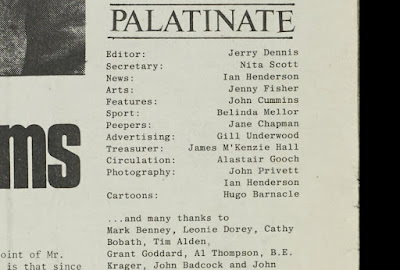
The elected editor of Palatinate at the time was Jerry Dennis, an English Literature undergraduate who was not at all the typical upper-class student that Graham desired at ‘his’ university. Despite a posh accent, Dennis appeared somewhat hippy-like with a tall rake-thin body and long straight brown hair falling to his shoulders. He spoke languorously and purposefully with a keen wit and an analytical mind. He was fearless and unafraid to challenge the status quo, hence the investigative articles concerning Prydderch-Jones and Graham published in a fortnightly student newspaper that, until his appointment, had been more a gossip sheet and CV builder for adolescent essays by aspiring upper-crust authors.
Graham required revenge. Unfortunately for him, Dennis’ two-year academic record at Durham had been positive as he had passed all mandatory exams. Instead, Graham had to scour ancient statutes within the 1832 Act of Parliament and 1837 Royal Charter that had created England’s third-oldest university. There he discovered that a student accused of holding the university ‘in contempt’ could be expelled by a specially convened committee. This procedure had never been used in Durham’s century and a half history, though Graham was undaunted given the power he wielded. He set about convening the requisite brand-new committee of university personnel upon whom he could rely to do his bidding.
Weeks later, I was startled to find in my college pigeonhole an official letter from Ian Graham inviting me to be the one student that the statute required to attend the meeting of this committee which would be considering Dennis’ case. Out of the university’s 4,000 students, it was against all odds that I had supposedly been chosen randomly to consider a verdict on a fellow student with whom I was already acquainted. I could read between the letter’s lines. In reality, it had been sent as a warning shot across my bows, hinting that I might soon follow Dennis and be dispatched into the wilderness. Why?
That year, I had been tasked with writing the annual Durham Students’ Union submission to the university to request the following year’s Union funding through the aforementioned Composition Fee. My application was the most voluminous and forensic ever compiled, documenting why a substantial year-on-year increase proved necessary. The chair of the university Finance Committee, finance officer Alec McWilliam, seemed to appreciate my expertise in accountancy (the result of my mother having taught me double-entry bookkeeping and accounts reconciliation at the age of seven). The outcome was that McWilliam’s committee awarded Durham Students’ Union its largest ever year-on-year increase in funding.
However, for every winner, there has always to be a loser. My personal success meant that Ian Graham’s competing bid for additional funds for the Athletics Union had been rebuffed at the same committee meeting. For once, Graham was not getting all his own way and was probably not enamoured of this outcome. That was my reading of the reason I had received his letter. My suspicions were confirmed when I called the confirmation phone number in the letter and was told by a woman administrator at Old Shire Hall that my receipt of the invitation letter had been an ‘administrative error’. In fact, I had never been randomly selected to witness the ‘Inquisition’ against Jerry Dennis … who Graham’s committee agreed to expel at the end of his second year.
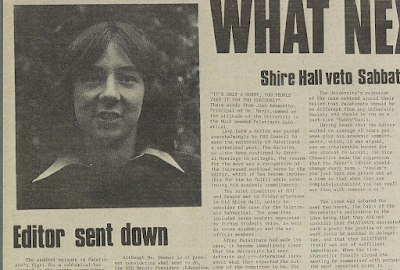
Palatinate subsequently published a front-page story beneath a photo of Dennis that noted “a considerable degree of shock and dismay at the apparently unsympathetic attitude taken by the University authorities towards this case, an attitude which several students believe to be almost vindictive.” It commented somewhat hesitantly that “the paper did adopt a particularly critical stance under the editorship of Mr Dennis, and many feel that it is not beyond the bounds of possibility that the difficulties he created for the University may not be totally unconnected with his present predicament.”
Incensed by Dennis’ expulsion, I wrote Palatinate a signed letter it published in October 1979:
“It is frightening to think that any students at this University can be sent down for not ‘keeping term’, which could mean:
Not attending a course of instruction (which could be a subsidiary [subject]) to the satisfaction of the Chairman of the Board of Studies concerned.Not attending ‘academic engagements to the satisfaction of the Board of Studies concerned.Not presenting written work as and when required unless excused in advance.Is it really fair to leave such vague definitions to the interpretation of the Chairman of the Board of Studies? How clearly are these conditions communicated to new students? How many students treat their lectures as ‘optional’?
It is a sobering thought that if YOU do not get on the right side of the Chairman of your Board of Studies (do you know who he/she is?) and you:
Miss a lecture because your alarm clock fails to go offMiss a tutorial because you muddle the dateHand in an essay late because you could not get the booksYOU could be accused of not keeping term …. Sweet dreams.”
If Ian Graham’s letter to me the previous term had been an oblique personal warning, this publication of my opinions ensured that there was now an oversized target on my back. That is a story for another day.

Despite this realisation, I was determined to persevere with investigating Ian Graham for a potential further article in Palatinate. Each new academic year, Graham distributed invitations for a ‘fresher’ party held in his flat to first-year female students arriving from the private schools he favoured. My then student girlfriend had a friend who was prepared to pose as one of these targeted young women. ‘KT’ was suitably talkative, pretty and had a posh accent. Although she was in her second year, she would attend using a ticket we wrangled from a new student who had no interest in taking up the offer.
KT arrived at Ian Graham’s flat the evening of the party with my Sony TCM-3 cassette recorder under her clothing, attached to a hidden lapel microphone. She was sufficiently bold to strike up conversation with Graham who, as hoped, suggested she return on her own for one of his “more private occasions.” However, after reviewing the tape recording, there was nothing substantial enough from their dialogue with which to craft an article. After much discussion, and in light of Jerry Dennis’ expulsion, we decided regrettably that a further ‘mission’ to follow up Graham’s invitation would prove too dangerous for KT’s academic future. His annual recruitment of ‘pretty young things’ would continue regardless.
I had been upset, angry and horrified by Jerry Dennis’ expulsion. I still am. It was me who had analysed the audited financial data for the article Dennis published about DUAU’s finances. I was partly responsible for the ructions caused with Ian Graham. However, it frustrates me that, whenever Palatinate is mentioned now in the media, its former student editors Hunter Davies and Harold Evans are frequently vaunted for their subsequent glittering journalistic careers. From my perspective, it was Dennis who introduced investigative journalism into the formerly staid student newspaper … and paid a terrible price. The Jerry Dennis I recall remains an inspiration.
On 27 December 1984, Ian Graham was returning to Durham from Edinburgh by car when he was involved in an accident in which he died from his injuries. His official university obituary mentioned his “happy and congenial social life” and noted that, for many Durham graduates, “the name of Ian Graham has been something of a legend.”
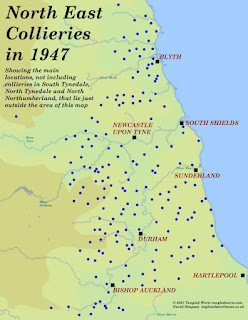
In March that year, the British government had announced the initial closure of twenty coalmines, including one in County Durham, with the loss of 20,000 jobs. It was the cornerstone of a deliberate strategy by then prime minister Margaret Thatcher to destroy the strong trade unions within traditional North of England industries, the dominant employer of working-class people there. This annihilation was enabled by financial and electoral support for Thatcher’s Conservative Party provided by successive generations of the very same privileged, wealthy class of (mostly) southerners with whom Ian Graham had successfully populated Durham University. Their ideological objective destroyed the surrounding County Durham local economy and created mass unemployment on a hitherto unseen scale.
The figurines of miners carved into the front of that huge wooden Edwardian reception desk in Old Shire Hall would have wept at the ease with which their new owner’s affluent cohorts had so casually succeeded in destroying their centuries-old livelihoods. Before long, coalmining disappeared altogether from Durham.
December 15, 2024
You little trust-maker, you’re a heart-breaker : 2006 : Claire Enders, Enders Analysis
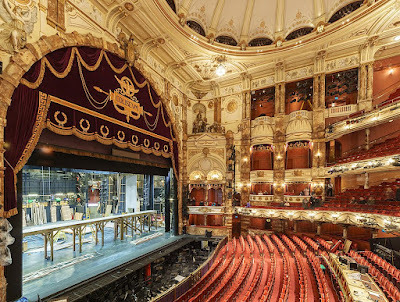
I was seated in the London Coliseum in St Martin’s Lane watching a performance, hardly my usual weekday evening entertainment. It was my first time ‘at the opera’ and I had absolutely no comprehension of the storyline unfolding on-stage. Instead, my mind was wandering to a recent rewatch of the 1976 horror film ’The Omen’. It was ostensibly about the cruel, devilish offspring of a United States ambassador to London who delights in plotting terrible ends for the adults around him, his elevated status immunising him from scrutiny. Viewing it again, I had wondered if the movie had been written by American screenwriter David Seltzer as an allegory for the subset of wealthy, privileged heirs who zealously execute their destructive ambitions to make life hell for the ‘little people’ around them. In Hollywood? In London?
During my career in a media industry dominated by the privileged, I have observed many such ‘fortunates’ seemingly glide effortlessly through their gilded lives, exercising a steely determination to wreak havoc and mayhem on us ‘unfortunates’. One colleague at a London ‘indie’ record company was driven to suicide by his manipulative, lying boss who subsequently was promoted to the top of the industry with impunity. I had mentored an excellent daytime radio presenter with incredible ratings who was sacked by a new station boss lacking any radio production experience, ostensibly because the DJ in question was black. He never worked in radio again. I have witnessed the ease with which talented Brits’ careers and lives have been destroyed by managers wielding their power of destruction in a sad indictment of Britain’s rotten class system.
The British political system stinks in exactly the same way. Think chancellor George Osborne’s imposition of a wholly unnecessary ‘austerity’ policy in 2010-2016 that reduced so many to poverty in order to further enrich the already rich. Think the entire ‘Brexit’ scam dreamt up by Old Etonians to wilfully impoverish the entire non-privileged nation. While the rest of us lose sleep fretting about how to pay our red reminders, those lacking such money worries are granted sufficient time and energy to plan and plot ways to destroy others’ lives. I have no idea why some who inherit so much wealth seem to delight in destroying the lives of those of us lacking silver spoons.
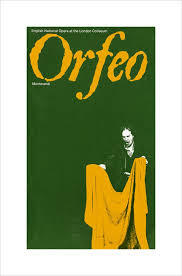
Why was I at the opera? I was three weeks into a new media analyst job in London when my boss kindly offered me and a work colleague two tickets each to attend English National Opera’s performance of Monteverdi’s ‘Orfeo’, described by the ‘Financial Times’ as “so entrancing that analysis can only belittle its impact.” This unexpected invitation to such a posh event had necessitated the hasty purchase of a designer formal jacket for me, my most costly clothing purchase ever, and a smart dress for my wife, rendering the invitation not as ‘free’ as it had initially appeared. I had never had to dress up like this to skank beside the speaker columns of Jah Shaka’s reggae sound system nights! However, having just started with my latest employer, it seemed churlish not to accept such an apparently generous offer.
So, there we were, my wife and I sat together for two hours (without interval) on the venue’s plush front row seats in our finery, accompanied by my work colleague and her partner. I had no inkling my boss would be attending too, but there she was, sat between us two couples as if an enthroned queen flanked by loyal courtiers. It was all very civilised. A night at the opera! How innocent the occasion appeared. I wondered whether there would be further ‘refined’ cultural events I might be invited to attend, their expense normally off-limits over two decades living in London. At the end of the performance, we said our goodbyes and headed home our separate ways. For one night, I had been a guest in posh peoples’ world. I was not reflecting upon why my new workmate and I alone out of the larger analyst team had been offered invites.
My young female colleague had arrived at Enders Analysis unannounced soon after me. ‘HT’ was likewise employed there as a media analyst, having just relocated from a plum job at the German office of a global entertainment business in order to join her boyfriend in London. Until her appearance, I had been hastily installed at a spare desk in a cramped, noisy upstairs office shared with other analysts. It was less than ideal to be in such close proximity to the incessant banter of loud, patronising former private schoolboys. Then, Claire Enders instructed HT and me to work together in a previously unoccupied large basement office that was eerily spacious and quiet. We were given our first client project that would utilise our combined knowledge of the music industry and copyright systems.
We quickly found other things we had in common. We were both ‘outsiders’ compared to the company’s all-male all-Brit analyst staff that, mostly toff, appeared to have scant hands-on industry experience. HT was North American, while I had relocated there for six years and had worked for a large American media public corporation. We set to work on our first little client project which pleasingly necessitated little contact with our colleagues sat two floors above us. Our basement room felt like a private oasis of calm compared to the strident, booming male voices prevalent upstairs.
For lunch, the men upstairs would frequent a local ‘greasy spoon’ café whose food had made me ill after accepting an invitation to accompany them during my first week, or they visited a ‘Spaghetti House’ restaurant. Cooked lunches had never been my thing. I preferred a sandwich or wrap, so I would accompany HT to the local ‘Pret A Manger’ or ‘Eat’ to buy takeaways. Frankly, after my initial attempt at social lunching with the lads upstairs, during which they had grilled me about which school I had attended thirty years ago, enquiring whether it was a ‘private’ grammar school, I was relieved to have an excuse to escape their company.
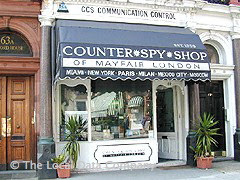
London’s Mayfair district proved a bizarre place to work. Not only is it the most expensive square on the ‘Monopoly’ board, it remains home to the city’s richest residents, costliest townhouses and most exclusive shops. Around the corner from our office was the shop window of ‘The Spy Shop’ in South Audley Street, displaying secret camera apparel and surveillance equipment hitherto only seen in James Bond movies. Shopfronts with beautifully lit showrooms had inordinately expensive huge shiny new cars inside to tempt a passing resident to pop in impulsively one lunchtime and casually lay down a volume of cash that could have bought me my first house.
HT and I would regularly walk past the Millennium Hotel in Grosvenor Square where former KGB spy Alexander Litvinenko would be poisoned later that year. When the weather allowed, we sat in the Square on a bench to eat our takeaways, overlooked by the United States Embassy and opposite the statue of American wartime president Franklin Roosevelt. HT laughed when, reading the plaque beneath the monument, I pronounced his middle name as ‘Del-AH-no’. The only person I had come across before with that name was Jamaican singer Delano Stewart whose song ‘Stay A Little Bit Longer’ had been one of my first reggae purchases in 1970.
Other days, we would walk further to the ‘Eat’ shop on Berkeley Square, sit inside if it was wet or otherwise find a bench in the Square, chatting about our working lives before having been thrown together by our present employer. On one occasion, we walked after lunch to the Myanmar embassy on Charles Street to pick up visitor visas for HT and her boyfriend to take a vacation booked there. I kept my opinion to myself about supporting an oppressive regime through international tourism. These carefree lunchtimes made my job bearable at a time when I was already finding our employer’s master/servant management style worryingly reminiscent of ‘Upstairs Downstairs’.
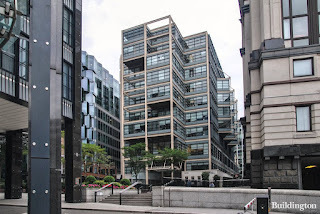
After a few weeks in the basement office, we completed our first project successfully and I was hoping that we would be asked to work together in the service of a further client, given how successful and productive we had been. However, it was not to be. I was sent to the offices of a law firm to work for weeks on a project that would occupy the rest of my year. Despite her expertise on the issues with which I was now tasked, HT was elsewhere working on other projects. At my new location in an office block above City Thameslink station, I now ate lunch alone in a cheap nearby takeaway. Those carefree spring and summer days munching our food together became a distant memory. I no longer had a lunchtime respite from the oppressive work environment in which I was immersed.
Months later, on a rare occasion when I returned to the Mayfair office, HT buttonholed me and asked if we could chat privately. She seemed uncharacteristically worried and upset. She told me about two distinct issues that understandably frightened her. Our boss, Claire Enders, had contacted her boyfriend after the opera event we had attended and the two had talked without her prior knowledge. Secondly, her boyfriend had come to believe that HT and I were having some kind of workplace affair. I was astonished. This was all unknown to me, I explained. I had certainly done nothing to propagate such a falsehood. Whether she believed me or not, I never discovered. Mine was an innocent friendship with a woman who was closer to the age of my daughter than to old-man me. What could I do to rescue this situation? Apparently, nothing.
Weeks later, I learnt indirectly that HT had quit work, though there had been no goodbye or official announcement. She had simultaneously broken up with her boyfriend and returned to her home city in North America, presumably to rebuild her career. I was shocked and saddened. What had precisely happened I would never know, but it might appear to an observer that my positive working relationship with HT, unbeknownst to me, had proven a catalyst for forces that I had neither anticipated nor understood. Nobody else in our workplace seemed the least concerned about HT’s disappearance after her few months there.
Much later, in March 2007, Claire Enders asked me to contact HT to request some information about a project she had done during her time in our office. I refused, explaining that I did not feel HT would want ever again to hear from anybody at Enders Analysis. I did wonder why I was singled out for this task rather than any one of my colleagues. It felt like a concerted effort to rub salt into the fatally wounded relationship between myself and HT. Enders persisted and so I eventually did write a cringingly inappropriate email begging for information. I received no reply and understandably so. I never heard from HT again.
Perhaps this was just a strange workplace misunderstanding into which I might have read too much, you could be thinking. Mmmm. Later that year, a young female intern was given a temporary desk in our crowded basement office of all-male analysts in Mayfair. Such interns were usually the offspring of high-flying media owners whom Claire Enders had befriended and they often displayed almost zero interest in our work. This one was unusual because she was a student friend of Claire Enders’ daughter at St Andrews University, the alma mater of British royalty and the rich.

Everyone else in the office rudely ignored her presence so I chatted with her and discovered she was a big music fan. I lent her my ‘C86’ NME cassette, a compilation of my original Scottish ‘Postcard Records’ singles that I treasure, and a reissued Ella Washington CD of soul recordings for ‘Sound Stage 7’. When she admitted she had no record player in her rented London accommodation, I lent her one of my vinyl turntables, barely touched since my pirate radio days. We chatted regularly in the office environment and that was it. She was around the age of my daughter.
After a few weeks’ work, the intern confided that Claire Enders had started to allege she was self-harming. I had seen no evidence to support such an accusation and was shocked that such a serious assertion had been made. I could offer no explanation as to why this was happening. Then, at home in the kitchen one evening after work, I received a call from the intern’s parents who asked if I could elucidate why their daughter was being falsely accused of self-harm. I could not. Then the parents alleged that they had received numerous unprompted calls from Claire Enders insisting they act to resolve their daughter’s supposedly poor mental health. They told me they were considering a referral to the police to stop these unwanted calls. Their daughter left our workplace immediately afterwards and later returned by post the articles she had borrowed from me.
By now, I had witnessed sufficient strange behaviours in that workplace to understand that the environment there was not what I considered ‘normal’. I hung on to the job for almost three years before being edged out myself in similarly bizarre circumstances. Afterwards, I discovered that Claire Enders is the offspring of a former United States ambassador born “into a family of wealthy patricians” and who, attending Yale, was “a member of one of the secret societies which are said to guarantee success in life”, according to ‘The Independent’. His 1996 ‘New York Times’ obituary said his “career was highlighted by cold war intrigues in tropical climes”, having survived three assassination attempts whilst stationed in Cambodia. Why was I reminded of 'The Omen'?
During 2008, I was given so much work at Enders Analysis that I only managed to take a single day’s holiday the entire year to attend my daughter’s graduation ceremony. Having explained the reason for my absence, Claire Enders regularly suggested she could find employment for my daughter through her contacts. No enquiry seemed necessary about her studied subject or what might be her interests or ambitions. This is how the job market appears to work amongst the privileged. You can always be found a highly paid job bossing around ‘little people’ in some workplace, regardless of having no relevant experience or understanding of the industry. Admittance requires only proof that you too are proposed by one of the chosen few. After the things I had witnessed in my workplace, I would have preferred my daughter be unemployed than participate in the ‘gravy train’ of the upper classes. Nobody from my job is infiltrating my harmonious family!
After my first night at the opera, I was never invited by Enders to another social event. Neither have I had occasion to wear my expensive jacket again.
November 3, 2024
LBC 97.3 FM, London's whitest conversation? : 2007 : 'Is Radio Racist?', The Radio Academy
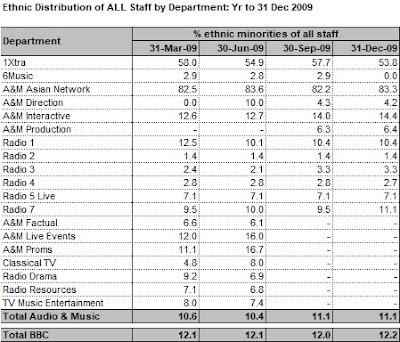
The conversation at the Radio Academy event in London entitled 'Is Radio Racist?' became heated when the chairman, 'LBC' morning show presenter James O’Brien [JO], was questioned by 'BBC Five Live' overnight presenter Dotun Adebayo [DA] about the absence of ethnic minority presenters at LBC. At the start of the event, O’Brien said he had been asked to chair the debate because “I am actually officially the whitest person working in the broadcasting industry today.”
DA: “James, you work for a London station. How many black presenters are there, when 20% of the London population is African-Caribbean or Asian? How many black presenters are there on LBC?”
JO: “That’s interesting because there aren’t any black presenters currently.”
DA: “If I ask James how many black cleaners there are at LBC, it would be a high percentage.”
JO: “For what it’s worth, that’s not true. If you had asked me about production staff, I would point at two or three colleagues, both current and former, who are from ethnic minorities. I object to that question because I don’t think their colour is relevant to their ability to do the job.”
DA: “That wasn’t the point. I gave you one example of London media where there are no [ethnic] presenters. You should be embarrassed about that, James.”
JO: “I think that, at the moment, I am the best person to be presenting my show and colour is entirely irrelevant to that equation. If someone who is better than me comes along, they will get my job, whatever colour they are. I would hope my employer would have the bravery to appoint the best person for the job and not say…..”
DA: “How can you explain the fact that there isn’t one black presenter on your station?”
JO: “How would you like to be the one who only got the job because there aren’t any black people on the station?”
DA: “I would be happy to get the job because at least it was an opportunity for me, whereas there is no opportunity for me there at the moment. There are no black presenters at LBC. That’s something that’s disgraceful and you know that.”
JO: “I dispute that entirely, but it’s not about me. If you want to hear me talk about myself, I’ll be back on LBC 97.3 FM tomorrow morning [laughter from audience].”
Later in the debate, Salim Salam [SS], a former BBC producer now working for digital station 'Colourful Radio', returned the discussion to the same issue:
SS: “It’s a managerial question. Given that you want to have a media industry which is broadly reflective of the society in which it operates, and in the case of the BBC is directly paid for by that society, then you should be looking to get (LBC being an example) a station which is broadly representative of the society to which it is broadcasting. And the fact that it’s not is a managerial question.”
JO: “LBC takes up 24 hours of programming, of which every single one, expect for two [hours] between 5 and 7am, is phone-in. So if you want to talk about a radio station that provides a platform and an opportunity for every single citizen in the city to put forward their case, their perspective, their experience or their opinion, a phone-in programme or a phone-in station is almost immune to these accusations.”
SS: “No, it’s not, because I’m talking about the people who present the programmes and who make the programmes, which actually affects the editorial. There are two elements to this question. One is: who’s making the programmes and who’s presenting the programmes, and who’s doing the hiring and firing? … The other question is the editorial, and it’s not always a question of people walking around deliberately looking for opportunities to discriminate against black people. It’s about the questions that you ask. Muslim people, for example, have a hell of a lot of questions to ask about a lot of things. There’s nobody asking those questions for them because the editorial lines that are being taken all come from one particular point of view, and then the questions that are asked follow the perceived lines of wisdom or the orthodoxy of the time. So, if you are looking for an industry that is broadly reflective of the society in which it operates, you have got to ask yourself why is it not (whether it is racism or not)? Secondly, if you are looking for solutions to that, look at who is doing the hiring and firing. Who do they know? Are they capable of making a rational judgement when they are faced with those applicants? The BBC’s own figures will tell you that black people, once they get to the final interview stage, are still three times less likely to get the job than their white counterparts. Are you telling me that black people are three times less talented or able? I’m not of that opinion. I think it’s either unconscious discrimination, or whatever it is.”
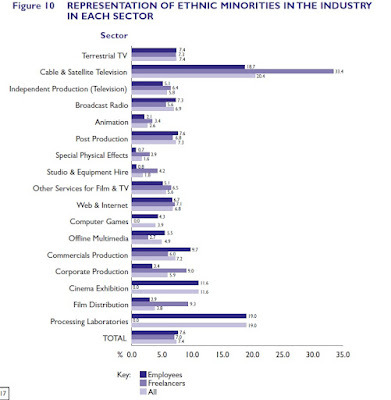
Jimmy Buckland, external affairs officer of RadioCentre, provided the meeting with data from the forthcoming SkillCentre 2006 Employment Census which found the radio industry overall employs 6.9% of staff from black and minority ethnic backgrounds, comprising 3.1% in commercial radio and 10.9% in BBC radio. Explaining that these results appear skewed because “commercial radio is more regional based than the BBC”, Buckland said that 19% of commercial radio’s workforce is based in London, compared to 59% of the BBC’s. He added: “What we have here is a problem of representation, definitely.”
[First published in edited form in 'The Radio Magazine' as 'LBC Quizzed Over All-White Presenter Team', #777, 28 February 2007]



